#SoftSkills
Scott M. Graffius Speaking at Frug'Agile Conference Armenia and France 2021
21 September 2021
Follow @scottgraffius

Scott M. Graffius will speak at October 2021 edition of Frug'Agile Conference (Photo of Khor Virap monastery in the shadow of Mount Ararat by Andrew Behesnilian; used under license, CC BY-SA 3.0)
🔥 Update: The Frug'Agile Conference recorded sessions and made the videos available to the public. The video of Scott's talk is included at the end of this post.
Scott M. Graffius will be speaking at the October 2021 edition of Frug’Agile. The conference will take place in Armenia and France, attendees can participate in-person or virtually, and sessions will be delivered in French or English. Scott will present “The Journey to Happier and More Productive Agile Teams” — in English — on Friday, October 15th at:
🕖 Armenia Time: 7:00-8:00 p.m. AT
🕔 Central European Time: 5:00-6:00 p.m. CET
🕗 Pacific Time: 8:00-9:00 a.m. PT
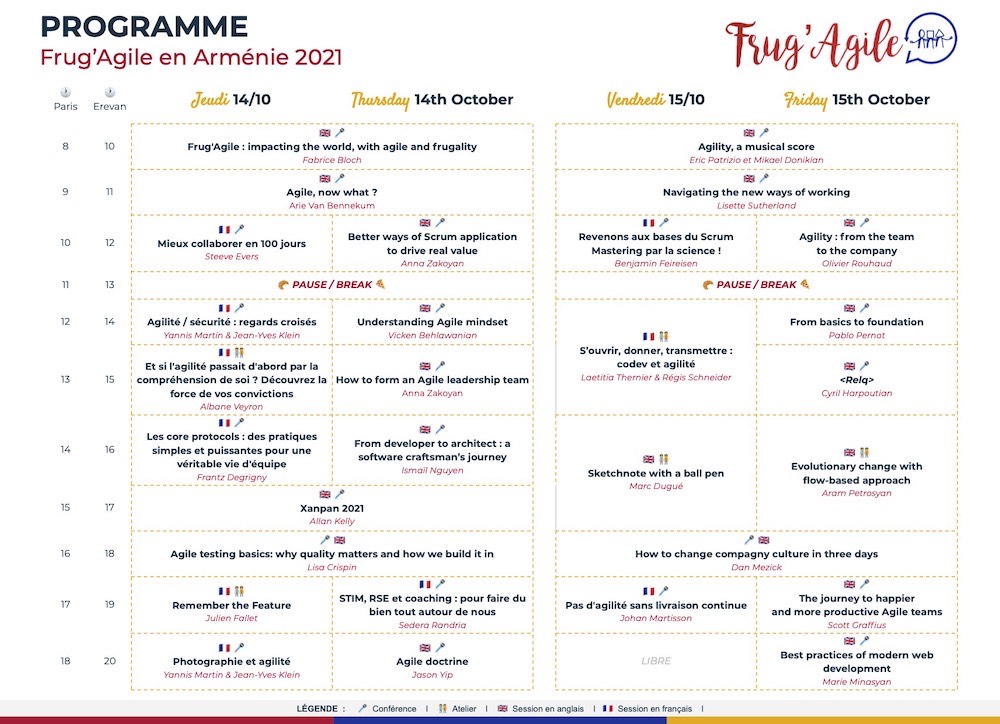
Attendees may be eligible to receive continuing education unit (CEU) credit, equivalent to 1.00 Professional Development Hour (PDH). For reporting with the Project Management Institute (PMI), it's 1.00 Professional Development Unit (PDU), under the Leadership category. For reporting with the Scrum Alliance, it's 1.00 Scrum Educational Unit (SEU), under either the Learning category or the Events category. For reporting with other organizations, refer to their respective instructions.
To learn more and to secure tickets for the conference, visit https://www.frugagile.org.


About Scott M. Graffius

Scott M. Graffius, PMP, CSP-SM, CSP-PO, CSM, CSPO, SFE, ITIL, LSSGB is an agile project management practitioner, consultant, award-winning author, and international speaker. He has generated over one billion dollars of business value in aggregate for the organizations he has served. Graffius is the founder, CEO, and principal consultant at Exceptional PPM and PMO Solutions™ and subsidiary Exceptional Agility™, based in Los Angeles, California. His expertise spans project, program, portfolio, and PMO leadership inclusive of agile, traditional, and hybrid approaches. Content from his books (Agile Scrum and Agile Transformation), workshops, speaking engagements, and more have been featured and used by businesses, governments, and universities including Gartner, Microsoft, Deloitte, Oracle, Cisco, Ford, Qantas, Atlassian, Bayer, the National Academy of Sciences, the United States Department of Energy, the United States Army, Project Management Institute, the IEEE, the New Zealand Ministry of Education, Tufts University, Texas A&M University, Virginia Tech, Penn State, Warsaw University of Technology, University of Waterloo, Loughborough University London, and others. Graffius has spoken at 58 conferences and other events around the world, including Armenia, Australia, Brazil, Canada, Czech Republic, Finland, France, Germany, Greece, India, Ireland, Lithuania, Luxembourg, Netherlands, New Zealand, Sweden, United Kingdom, and the United States. Thinkers360 named Graffius a global top thought leader and influencer in four domains: Agile, Change Management, Digital Transformation, and GovTech.
His full bio is available here.
Connect with Scott on:
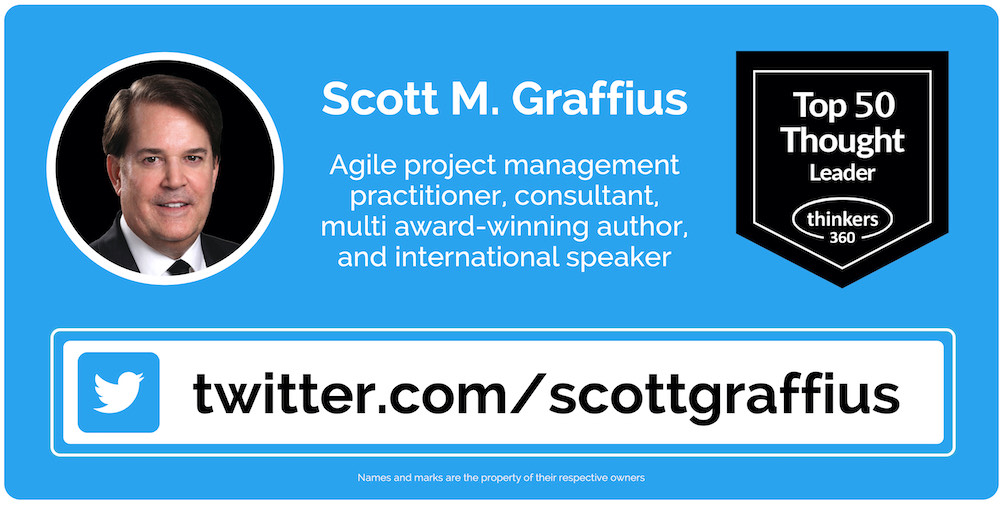

About Agile Scrum: Your Quick Start Guide with Step-by-Step Instructions
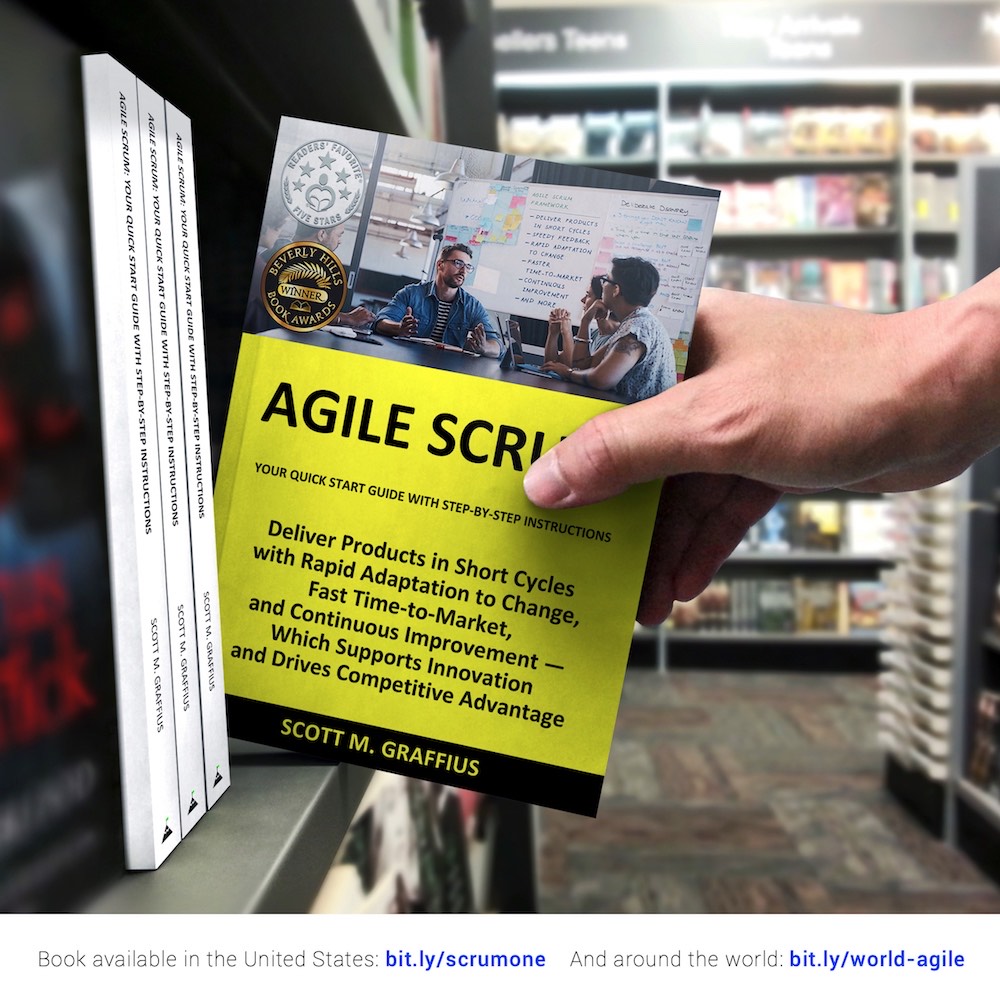
Shifting customer needs are common in today's marketplace. Businesses must be adaptive and responsive to change while delivering an exceptional customer experience to be competitive.
There are a variety of frameworks supporting the development of products and services, and most approaches fall into one of two broad categories: traditional or agile. Traditional practices such as waterfall engage sequential development, while agile involves iterative and incremental deliverables. Organizations are increasingly embracing agile to manage projects, and best meet their business needs of rapid response to change, fast delivery speed, and more.
With clear and easy to follow step-by-step instructions, Scott M. Graffius's award-winning Agile Scrum: Your Quick Start Guide with Step-by-Step Instructions helps the reader:
Hailed by Literary Titan as “the book highlights the versatility of Scrum beautifully.”
Winner of 17 first place awards.
Agile Scrum: Your Quick Start Guide with Step-by-Step Instructions is available in paperback and ebook/Kindle in the United States and around the world. Some links by country follow.

About Agile Transformation: A Brief Story of How an Entertainment Company Developed New Capabilities and Unlocked Business Agility to Thrive in an Era of Rapid Change
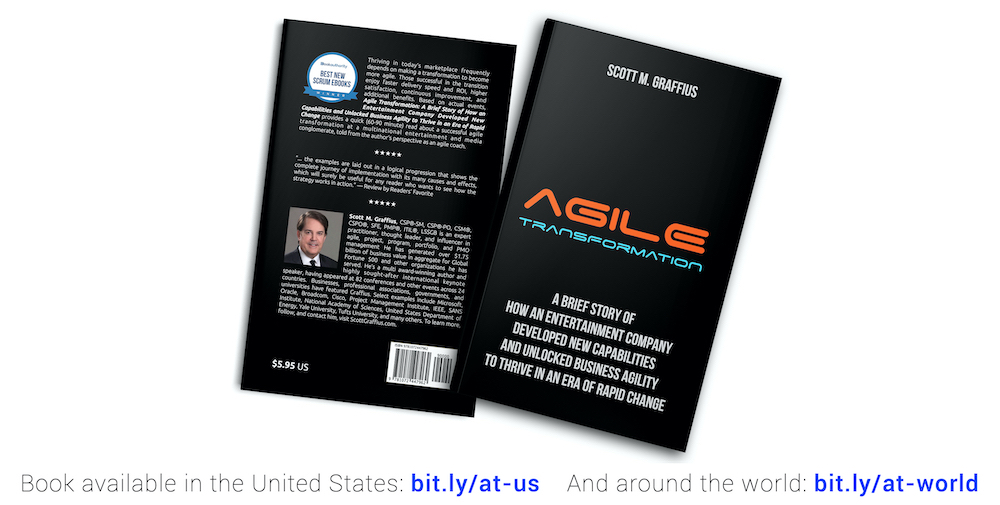
Thriving in today's marketplace frequently depends on making a transformation to become more agile. Those successful in the transition enjoy faster delivery speed and ROI, higher satisfaction, continuous improvement, and additional benefits.
Based on actual events, Agile Transformation: A Brief Story of How an Entertainment Company Developed New Capabilities and Unlocked Business Agility to Thrive in an Era of Rapid Change provides a quick (60-90 minute) read about a successful agile transformation at a multinational entertainment and media company, told from the author's perspective as an agile coach.
The award-winning book by Scott M. Graffius is available in paperback and ebook/Kindle in the United States and around the world. Some links by country follow.

About Frug’Agile Conference
Frug’Agile 2021 is a global conference on agile. The theme for this edition is "back to basics," and it runs from October 14-15. The conference features speakers from Armenia, France, and around the world. Sessions will be presented in either French or English, and attendees may participate in-person — from venues in Armenia or France — or virtually.
To learn more about Frug’Agile, visit https://www.frugagile.org.

Update on November 13, 2021
If you missed the event, recordings of sessions are now available on YouTube. Scott's talk is at https://www.youtube.com/watch?v=ewokhrpMCIE and the video is also shown below.

The short link for this blog post is: https://bit.ly/frug-21
The short link for a related post on LinkedIn is: https://bit.ly/frug-in
© Copyright 2021 Scott M. Graffius. All rights reserved. This material may not be published, broadcast, rewritten or redistributed without the express written permission of Scott M. Graffius.


Scott M. Graffius will speak at October 2021 edition of Frug'Agile Conference (Photo of Khor Virap monastery in the shadow of Mount Ararat by Andrew Behesnilian; used under license, CC BY-SA 3.0)
🔥 Update: The Frug'Agile Conference recorded sessions and made the videos available to the public. The video of Scott's talk is included at the end of this post.
Scott M. Graffius will be speaking at the October 2021 edition of Frug’Agile. The conference will take place in Armenia and France, attendees can participate in-person or virtually, and sessions will be delivered in French or English. Scott will present “The Journey to Happier and More Productive Agile Teams” — in English — on Friday, October 15th at:
🕖 Armenia Time: 7:00-8:00 p.m. AT
🕔 Central European Time: 5:00-6:00 p.m. CET
🕗 Pacific Time: 8:00-9:00 a.m. PT

Attendees may be eligible to receive continuing education unit (CEU) credit, equivalent to 1.00 Professional Development Hour (PDH). For reporting with the Project Management Institute (PMI), it's 1.00 Professional Development Unit (PDU), under the Leadership category. For reporting with the Scrum Alliance, it's 1.00 Scrum Educational Unit (SEU), under either the Learning category or the Events category. For reporting with other organizations, refer to their respective instructions.
To learn more and to secure tickets for the conference, visit https://www.frugagile.org.

About Scott M. Graffius

Scott M. Graffius, PMP, CSP-SM, CSP-PO, CSM, CSPO, SFE, ITIL, LSSGB is an agile project management practitioner, consultant, award-winning author, and international speaker. He has generated over one billion dollars of business value in aggregate for the organizations he has served. Graffius is the founder, CEO, and principal consultant at Exceptional PPM and PMO Solutions™ and subsidiary Exceptional Agility™, based in Los Angeles, California. His expertise spans project, program, portfolio, and PMO leadership inclusive of agile, traditional, and hybrid approaches. Content from his books (Agile Scrum and Agile Transformation), workshops, speaking engagements, and more have been featured and used by businesses, governments, and universities including Gartner, Microsoft, Deloitte, Oracle, Cisco, Ford, Qantas, Atlassian, Bayer, the National Academy of Sciences, the United States Department of Energy, the United States Army, Project Management Institute, the IEEE, the New Zealand Ministry of Education, Tufts University, Texas A&M University, Virginia Tech, Penn State, Warsaw University of Technology, University of Waterloo, Loughborough University London, and others. Graffius has spoken at 58 conferences and other events around the world, including Armenia, Australia, Brazil, Canada, Czech Republic, Finland, France, Germany, Greece, India, Ireland, Lithuania, Luxembourg, Netherlands, New Zealand, Sweden, United Kingdom, and the United States. Thinkers360 named Graffius a global top thought leader and influencer in four domains: Agile, Change Management, Digital Transformation, and GovTech.
His full bio is available here.
Connect with Scott on:


About Agile Scrum: Your Quick Start Guide with Step-by-Step Instructions

Shifting customer needs are common in today's marketplace. Businesses must be adaptive and responsive to change while delivering an exceptional customer experience to be competitive.
There are a variety of frameworks supporting the development of products and services, and most approaches fall into one of two broad categories: traditional or agile. Traditional practices such as waterfall engage sequential development, while agile involves iterative and incremental deliverables. Organizations are increasingly embracing agile to manage projects, and best meet their business needs of rapid response to change, fast delivery speed, and more.
With clear and easy to follow step-by-step instructions, Scott M. Graffius's award-winning Agile Scrum: Your Quick Start Guide with Step-by-Step Instructions helps the reader:
- Implement and use the most popular agile framework―Scrum;
- Deliver products in short cycles with rapid adaptation to change, fast time-to-market, and continuous improvement; and
- Support innovation and drive competitive advantage.
Hailed by Literary Titan as “the book highlights the versatility of Scrum beautifully.”
Winner of 17 first place awards.
Agile Scrum: Your Quick Start Guide with Step-by-Step Instructions is available in paperback and ebook/Kindle in the United States and around the world. Some links by country follow.
- 🇧🇷 Brazil
- 🇨🇦 Canada
- 🇨🇿 Czech Republic
- 🇩🇰 Denmark
- 🇫🇮 Finland
- 🇫🇷 France
- 🇩🇪 Germany
- 🇬🇷 Greece
- 🇭🇺 Hungary
- 🇮🇳 India
- 🇮🇪 Ireland
- 🇮🇱 Israel
- 🇮🇹 Italy
- 🇯🇵 Japan
- 🇱🇺 Luxembourg
- 🇲🇽 Mexico
- 🇳🇱 Netherlands
- 🇳🇿 New Zealand
- 🇳🇴 Norway
- 🇪🇸 Spain
- 🇸🇪 Sweden
- 🇨🇭 Switzerland
- 🇦🇪 UAE
- 🇬🇧 United Kingdom
- 🇺🇸 United States

About Agile Transformation: A Brief Story of How an Entertainment Company Developed New Capabilities and Unlocked Business Agility to Thrive in an Era of Rapid Change

Thriving in today's marketplace frequently depends on making a transformation to become more agile. Those successful in the transition enjoy faster delivery speed and ROI, higher satisfaction, continuous improvement, and additional benefits.
Based on actual events, Agile Transformation: A Brief Story of How an Entertainment Company Developed New Capabilities and Unlocked Business Agility to Thrive in an Era of Rapid Change provides a quick (60-90 minute) read about a successful agile transformation at a multinational entertainment and media company, told from the author's perspective as an agile coach.
The award-winning book by Scott M. Graffius is available in paperback and ebook/Kindle in the United States and around the world. Some links by country follow.
- 🇦🇺 Australia
- 🇦🇹 Austria
- 🇧🇷 Brazil
- 🇨🇦 Canada
- 🇨🇿 Czech Republic
- 🇩🇰 Denmark
- 🇫🇮 Finland
- 🇫🇷 France
- 🇩🇪 Germany
- 🇬🇷 Greece
- 🇮🇳 India
- 🇮🇪 Ireland
- 🇯🇵 Japan
- 🇱🇺 Luxembourg
- 🇲🇽 Mexico
- 🇳🇱 Netherlands
- 🇳🇿 New Zealand
- 🇪🇸 Spain
- 🇸🇪 Sweden
- 🇨🇭 Switzerland
- 🇦🇪 United Arab Emirates
- 🇬🇧 United Kingdom
- 🇺🇸 United States

About Frug’Agile Conference
Frug’Agile 2021 is a global conference on agile. The theme for this edition is "back to basics," and it runs from October 14-15. The conference features speakers from Armenia, France, and around the world. Sessions will be presented in either French or English, and attendees may participate in-person — from venues in Armenia or France — or virtually.
To learn more about Frug’Agile, visit https://www.frugagile.org.

Update on November 13, 2021
If you missed the event, recordings of sessions are now available on YouTube. Scott's talk is at https://www.youtube.com/watch?v=ewokhrpMCIE and the video is also shown below.

The short link for this blog post is: https://bit.ly/frug-21
The short link for a related post on LinkedIn is: https://bit.ly/frug-in
© Copyright 2021 Scott M. Graffius. All rights reserved. This material may not be published, broadcast, rewritten or redistributed without the express written permission of Scott M. Graffius.

AI is a Team Sport: A Confluence of Diverse Technical and Soft Skills are Crucial for Success
01 May 2023
BY SCOTT M. GRAFFIUS | ScottGraffius.com

Select here to download this article as a PDF.
This article covers the significance of well-rounded AI teams, including how both soft and technical skills are critical and fuel success. It’s informed by Graffius' work on AI projects as well as research and coverage from DARPA, Exceptional Agility, IBM, IEEE, Intel, MIT, Microsoft, Nvidia, Samsung, Software Engineering Institute, Stanford University, United States Artificial Intelligence Institute, and others (all listed in the bibliography section of this article).

Introduction
Artificial Intelligence (AI) has emerged as a transformative force across a growing number of industries, revolutionizing how we live, work, and interact. From autonomous vehicles and virtual assistants to personalized recommendations and medical diagnoses, AI systems have become integral to our daily lives. Behind these cutting-edge, life-changing solutions are AI teams that possess a combination of soft skills—also known as core skills, interpersonal skills, people skills, power skills, transferable skills, or transversal skills—and technical expertise.
This article highlights the synergy between soft skills and technical skills in the world of AI. While technical skills provide the general foundation for AI development, it’s the soft skills that elevate AI projects to new heights. From effective communication and critical thinking to leadership and teamwork, soft skills play a pivotal role in translating technical knowledge and capabilities into real-world applications.
The thesis of this article is that the successful development and application of AI requires a combination of soft skills and technical expertise. Technical competencies alone are not enough. Rather, it’s the combination and integration of soft and technical skills that truly unlocks the power of AI.
Next, this article focuses on the importance of soft skills in the AI landscape, highlighting how they complement and enhance technical abilities. The collaboration between these skill sets drives AI innovation.

Understanding Soft Skills in AI Teams
In the realm of AI, technical expertise often takes center stage. However, soft skills advance the successful outcomes of AI projects, as they facilitate effective communication, foster collaboration, and promote critical thinking. Soft skills are powerful facilitators of success.
Soft skills encompass a range of interpersonal and cognitive abilities that enable teams to work harmoniously, adapt to evolving challenges, and solve complex problems. In the AI landscape, where multidisciplinary teams come together to create innovative solutions, these soft skills are essential.
Effective communication stands at the forefront of soft skills in AI. AI teams must articulate complex technical concepts in a manner that is understandable to diverse stakeholders, including non-technical staff and internal or external customers/users. Clear communication promotes collaboration and ensures alignment of purpose and objectives throughout the AI development lifecycle.
Soft skills such as problem-solving and critical thinking are vital as well. AI teams frequently encounter multifaceted challenges, and it is through these soft skills that teams can identify potential bottlenecks, navigate complexities, and devise innovative solutions. By leveraging critical thinking, AI team members can evaluate different approaches, consider ethical implications, and make informed decisions that shape the development and application of AI systems.
Leadership and teamwork skills are also paramount. AI projects involve team members from diverse backgrounds, including data scientists, engineers, domain experts, designers, and others. Effective leadership enables the coordination of efforts and guides the project towards success. Similarly, teamwork skills foster an environment of trust and respect, promoting synergy among team members and enhancing overall productivity.
Recognizing the importance of soft skills in AI is crucial for fostering a balanced and effective team dynamic. It ensures that AI teams possess the interpersonal and cognitive abilities necessary to bring AI projects to fruition. The integration of soft skills alongside technical expertise sets the stage for a cohesive team capable of tackling complex AI challenges with agility and innovation.
The role of technical skills—including how they intersect with soft skills to create a powerful combination that drives success—are covered next.
The Role of Technical Skills in AI Teams
Technical skills provide the tools and knowledge required to design, build, and implement AI systems. This section explores the role that technical skills play in AI and their specific applications in various stages of AI projects.
Technical skills are essential for AI projects. They enable team members to translate concepts, theories, and algorithms into practical applications. However, technical skills alone are not sufficient for success. The collaborative nature of AI development and the need for a well-rounded AI team—including the synergy between technical skills and soft skills—is covered next.
The Power of Synergy: Soft Skills and Technical Skills in AI Teams
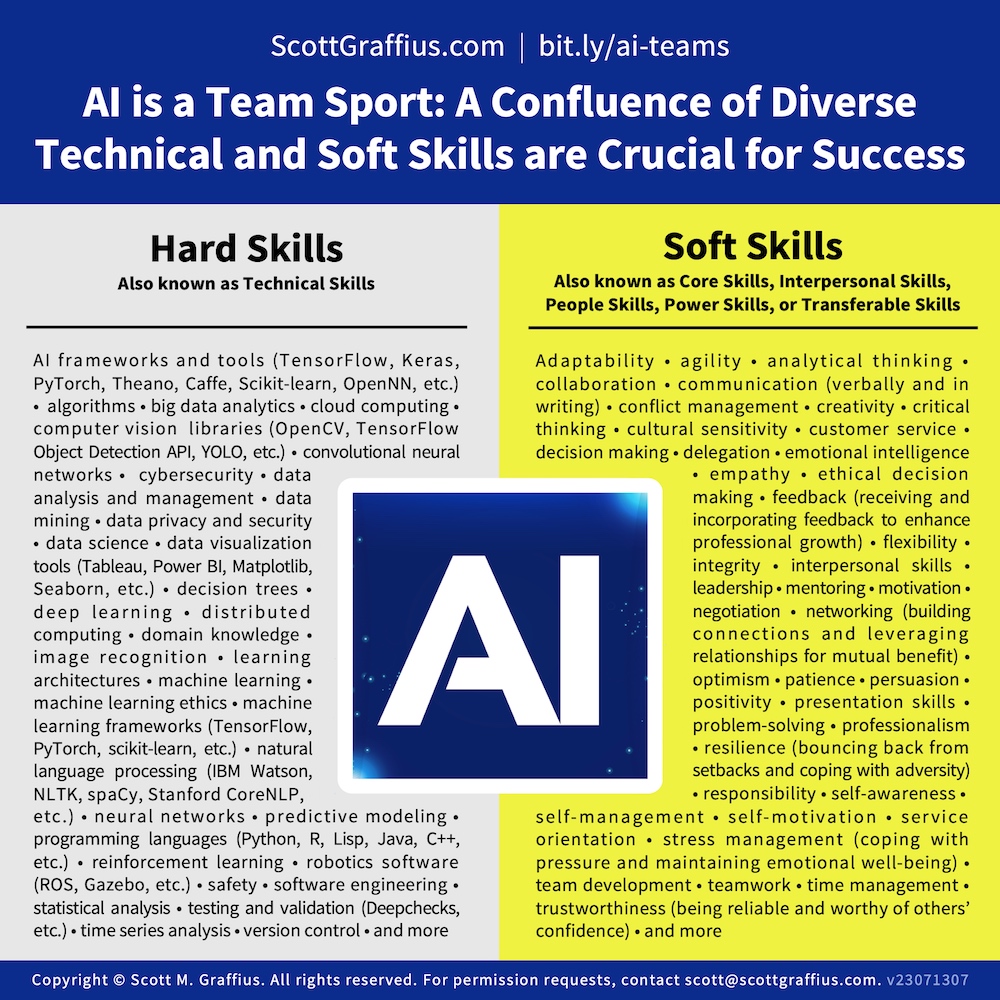
The convergence of technical and soft skills is where true innovation and breakthroughs occur. The successful development and application of AI systems rely not only on technical expertise but also on the harmonious integration of soft skills. Here’s some examples of the power of synergy between these skill sets, including how they work together to drive AI advancement:
The synergy between soft skills and technical skills is the catalyst that drives AI projects towards success. It enables AI teams to go beyond technical expertise and develop AI systems that address real-world problems effectively. By embracing a holistic approach that values both soft skills and technical skills, organizations can foster an environment where AI thrives, resulting in innovative solutions that have a positive impact on society.
Strategies for developing and nurturing soft skills are covered next.
Developing and Advancing Soft Skills in AI Teams
AI teams need soft skills to be successful. Organizations and teams should prioritize the development and advancement of these skills. Here are some strategies to enhance soft skills and foster a well-rounded AI workforce:
By implementing these strategies, organizations can cultivate a workforce that excels not only in technical skills but also in the essential soft skills required for AI success. Nurturing well-rounded AI professionals creates a collaborative and adaptive environment, where AI teams can effectively address complex challenges, drive innovation, and deliver impactful solutions.
The next section wraps up this exploration.
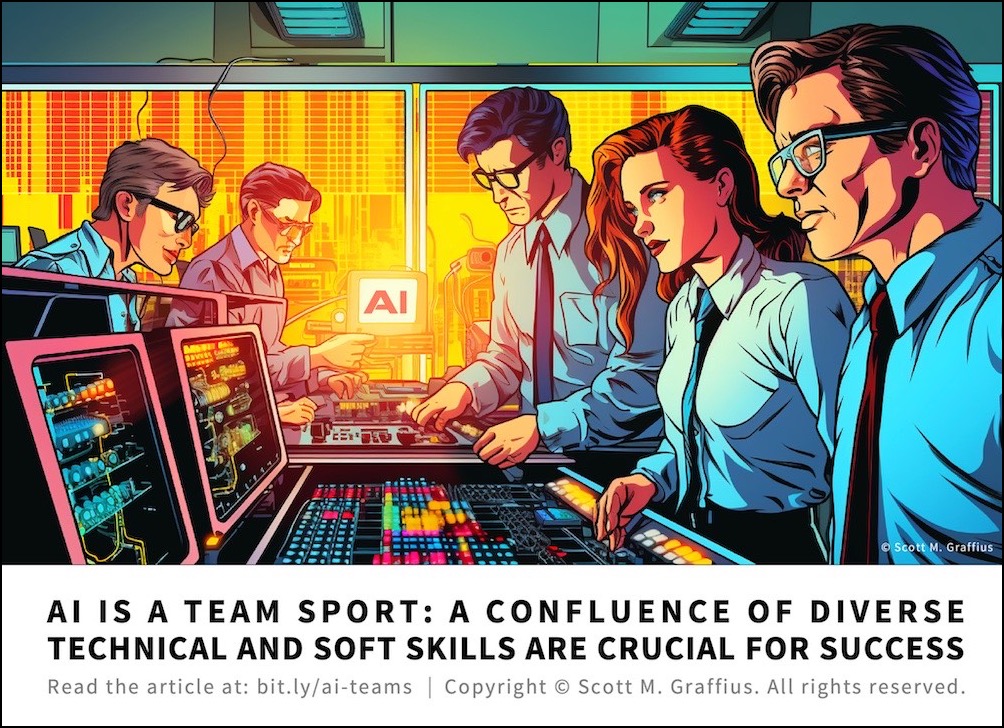

Conclusion
The successful development and application of AI systems rely on the synergy between soft skills and technical skills. While technical expertise forms the foundation, it's the integration of soft skills that elevates AI projects to new heights. Effective communication, collaboration, critical thinking, and leadership are among the key soft skills that enable AI teams to excel.
This article explored the significance of soft skills in AI, emphasizing their role in fostering effective teamwork, problem-solving, and innovation. It also acknowledged the indispensable role of technical skills in AI development, including programming languages, algorithms, data analysis, domain knowledge, and more.
Organizations can create well-rounded AI teams with a holistic set of abilities by embracing the power of synergy between soft skills and technical skills. AI team members with strong soft skills can effectively communicate their ideas, collaborate seamlessly, think critically, and provide leadership that empowers their teams.
To advance soft skills among AI professionals, organizations should invest in training programs, promote interdisciplinary collaboration, encourage continuous learning, and foster mentorship and coaching relationships. These efforts will help AI professionals develop the interpersonal and cognitive abilities necessary to thrive in the dynamic and collaborative AI landscape.
AI is a team sport that thrives on the confluence of soft skills and technical skills. By recognizing and embracing this synergy, organizations can unlock the full potential of AI, delivering innovative solutions that address real-world challenges and have a positive impact on the world.

References/Sources
All of the supplied links were functional when this article was published.

How to Cite This Article
Graffius, Scott M. (2023, May 1). AI is a Team Sport: A Confluence of Diverse Technical and Soft Skills are Crucial for Success. Available at: https://scottgraffius.com/blog/files/successful-ai-teams.html. DOI: 10.13140/RG.2.2.20321.79200.





About Scott M. Graffius

Scott M. Graffius, PMP, SA, CSP-SM, CSP-PO, CSM, CSPO, SFE, ITIL, LSSGB is an agile project management practitioner, consultant, multi-award-winning author, and international keynote speaker. He is the Founder of Exceptional PPM and PMO Solutions™ and subsidiary Exceptional Agility™. He has generated over $1.9 billion of business value in aggregate for Global Fortune 500 businesses and other organizations he has served. Graffius and content from his books, talks, workshops, and more have been featured and used by businesses, professional associations, governments, and universities. Examples include Microsoft, Oracle, Broadcom, Cisco, Gartner, Project Management Institute, IEEE, Qantas, National Academy of Sciences, United States Department of Energy, New Zealand Ministry of Education, Yale University, Tufts University, and others. He has delighted audiences with dynamic and engaging talks and workshops on agile, project management, and technology leadership at 85 conferences and other events across 25 countries.
His full bio is available here.
Connect with Scott on:
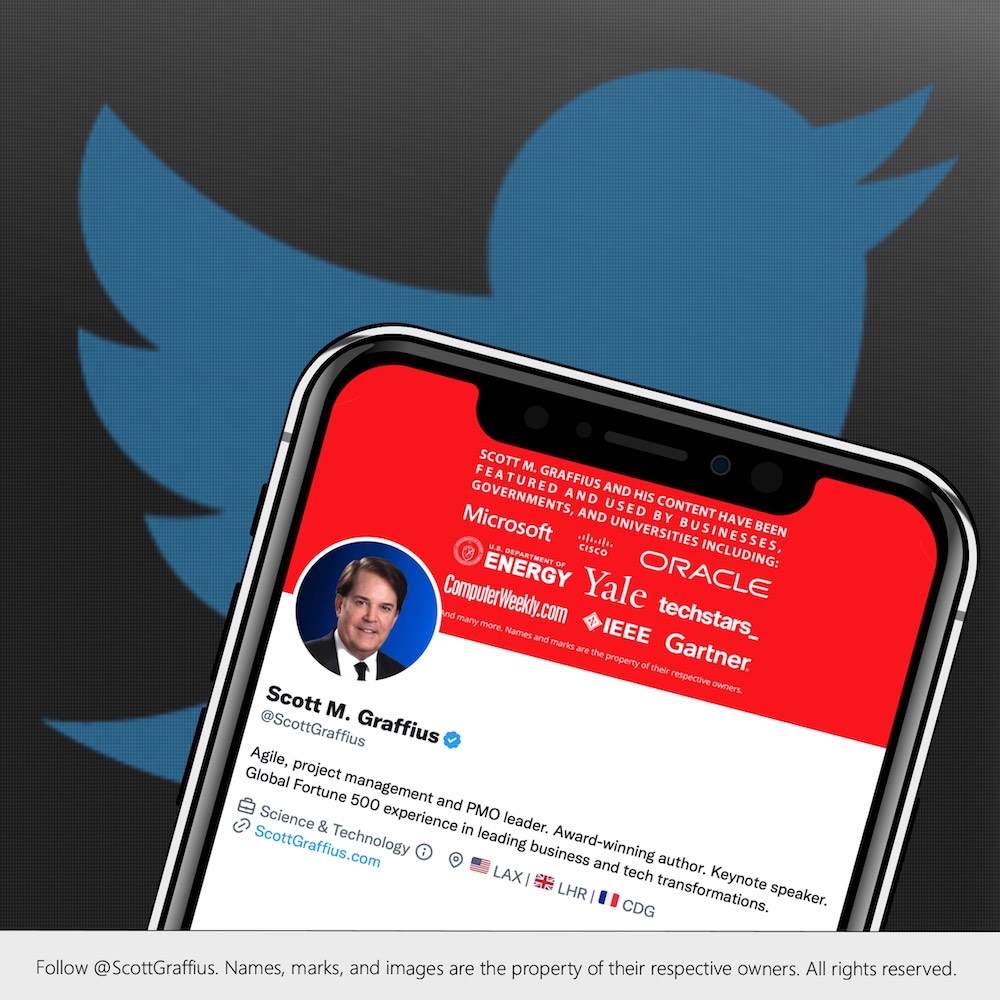

About Agile Scrum: Your Quick Start Guide with Step-by-Step Instructions

Shifting customer needs are common in today's marketplace. Businesses must be adaptive and responsive to change while delivering an exceptional customer experience to be competitive.
There are a variety of frameworks supporting the development of products and services, and most approaches fall into one of two broad categories: traditional or agile. Traditional practices such as waterfall engage sequential development, while agile involves iterative and incremental deliverables. Organizations are increasingly embracing agile to manage projects, and best meet their business needs of rapid response to change, fast delivery speed, and more.
With clear and easy to follow instructions, the multi award-winning Agile Scrum: Your Quick Start Guide with Step-by-Step Instructions book by Scott M. Graffius (Chris Hare and Colin Giffen, Technical Editors) helps the reader:
Hailed by Literary Titan as “the book highlights the versatility of Scrum beautifully.”
Winner of 17 first place awards.
Agile Scrum: Your Quick Start Guide with Step-by-Step Instructions is available in paperback and ebook/Kindle in the United States and around the world. Some links by country follow.

About Agile Transformation: A Brief Story of How an Entertainment Company Developed New Capabilities and Unlocked Business Agility to Thrive in an Era of Rapid Change

Thriving in today's marketplace frequently depends on making a transformation to become more agile. Those successful in the transition enjoy faster delivery speed and ROI, higher satisfaction, continuous improvement, and additional benefits.
Based on actual events, Agile Transformation: A Brief Story of How an Entertainment Company Developed New Capabilities and Unlocked Business Agility to Thrive in an Era of Rapid Change provides a quick (60-90 minute) read about a successful agile transformation at a multinational entertainment and media company, told from the author's perspective as an agile coach.
The award-winning book by Scott M. Graffius is available in paperback and ebook/Kindle in the United States and around the world. Some links by country follow.

The short URL for this article is: https://bit.ly/ai-teams
© Copyright 2023 Scott M. Graffius. All rights reserved. This material may not be published, broadcast, rewritten or redistributed without the express written permission of Scott M. Graffius.


Select here to download this article as a PDF.
This article covers the significance of well-rounded AI teams, including how both soft and technical skills are critical and fuel success. It’s informed by Graffius' work on AI projects as well as research and coverage from DARPA, Exceptional Agility, IBM, IEEE, Intel, MIT, Microsoft, Nvidia, Samsung, Software Engineering Institute, Stanford University, United States Artificial Intelligence Institute, and others (all listed in the bibliography section of this article).

Introduction
Artificial Intelligence (AI) has emerged as a transformative force across a growing number of industries, revolutionizing how we live, work, and interact. From autonomous vehicles and virtual assistants to personalized recommendations and medical diagnoses, AI systems have become integral to our daily lives. Behind these cutting-edge, life-changing solutions are AI teams that possess a combination of soft skills—also known as core skills, interpersonal skills, people skills, power skills, transferable skills, or transversal skills—and technical expertise.
This article highlights the synergy between soft skills and technical skills in the world of AI. While technical skills provide the general foundation for AI development, it’s the soft skills that elevate AI projects to new heights. From effective communication and critical thinking to leadership and teamwork, soft skills play a pivotal role in translating technical knowledge and capabilities into real-world applications.
The thesis of this article is that the successful development and application of AI requires a combination of soft skills and technical expertise. Technical competencies alone are not enough. Rather, it’s the combination and integration of soft and technical skills that truly unlocks the power of AI.
Next, this article focuses on the importance of soft skills in the AI landscape, highlighting how they complement and enhance technical abilities. The collaboration between these skill sets drives AI innovation.

Understanding Soft Skills in AI Teams
In the realm of AI, technical expertise often takes center stage. However, soft skills advance the successful outcomes of AI projects, as they facilitate effective communication, foster collaboration, and promote critical thinking. Soft skills are powerful facilitators of success.
Soft skills encompass a range of interpersonal and cognitive abilities that enable teams to work harmoniously, adapt to evolving challenges, and solve complex problems. In the AI landscape, where multidisciplinary teams come together to create innovative solutions, these soft skills are essential.
Effective communication stands at the forefront of soft skills in AI. AI teams must articulate complex technical concepts in a manner that is understandable to diverse stakeholders, including non-technical staff and internal or external customers/users. Clear communication promotes collaboration and ensures alignment of purpose and objectives throughout the AI development lifecycle.
Soft skills such as problem-solving and critical thinking are vital as well. AI teams frequently encounter multifaceted challenges, and it is through these soft skills that teams can identify potential bottlenecks, navigate complexities, and devise innovative solutions. By leveraging critical thinking, AI team members can evaluate different approaches, consider ethical implications, and make informed decisions that shape the development and application of AI systems.
Leadership and teamwork skills are also paramount. AI projects involve team members from diverse backgrounds, including data scientists, engineers, domain experts, designers, and others. Effective leadership enables the coordination of efforts and guides the project towards success. Similarly, teamwork skills foster an environment of trust and respect, promoting synergy among team members and enhancing overall productivity.
Recognizing the importance of soft skills in AI is crucial for fostering a balanced and effective team dynamic. It ensures that AI teams possess the interpersonal and cognitive abilities necessary to bring AI projects to fruition. The integration of soft skills alongside technical expertise sets the stage for a cohesive team capable of tackling complex AI challenges with agility and innovation.
The role of technical skills—including how they intersect with soft skills to create a powerful combination that drives success—are covered next.
The Role of Technical Skills in AI Teams
Technical skills provide the tools and knowledge required to design, build, and implement AI systems. This section explores the role that technical skills play in AI and their specific applications in various stages of AI projects.
- Programming Languages and Algorithms: Proficiency in programming languages such as Python, Java, or R is essential. These languages enable team members to write efficient code, manipulate and analyze data, and implement machine learning algorithms. Understanding algorithms, from classic ones like linear regression to cutting-edge deep learning models, empowers AI professionals to leverage mathematical principles and statistical techniques to train and optimize AI systems.
- Data Analysis and Management: AI relies on data, making data analysis and management skills crucial. AI team members need to be adept at collecting, cleaning, and preprocessing data, ensuring its quality and relevance. They must possess the knowledge of statistical methods, data visualization techniques, and data engineering practices to extract insights from complex datasets and prepare them for AI model training.
- Machine Learning and Neural Networks: Technical skills in machine learning are at the heart of AI systems. Understanding machine learning algorithms, such as decision trees, support vector machines, or convolutional neural networks, enables AI team members to create models that can learn from data and make intelligent predictions or decisions. Expertise in neural networks and deep learning architectures equips professionals with the ability to develop complex models capable of handling tasks like image recognition, natural language processing, and reinforcement learning.
- AI Frameworks and Tools: Proficiency in AI frameworks and tools (such as TensorFlow, Keras, PyTorch, Caffe, Scikit-learn, and others) are essential for building AI systems efficiently. These frameworks provide pre-built modules, libraries, and APIs that simplify the implementation of AI algorithms and models. Technical skills in utilizing these tools effectively enable AI team members to accelerate the development process, streamline model training, and optimize system performance.
- Domain Knowledge and Application-Specific Skills: Technical skills also encompass domain knowledge and application-specific expertise. Understanding the nuances of the industry or problem domain in which AI is being applied allows professionals to tailor AI solutions to meet specific requirements. For example, healthcare-focused AI projects may require knowledge of medical terminologies and regulatory considerations, while AI solutions for financial services may demand expertise in risk assessment and fraud detection.
Technical skills are essential for AI projects. They enable team members to translate concepts, theories, and algorithms into practical applications. However, technical skills alone are not sufficient for success. The collaborative nature of AI development and the need for a well-rounded AI team—including the synergy between technical skills and soft skills—is covered next.
The Power of Synergy: Soft Skills and Technical Skills in AI Teams

The convergence of technical and soft skills is where true innovation and breakthroughs occur. The successful development and application of AI systems rely not only on technical expertise but also on the harmonious integration of soft skills. Here’s some examples of the power of synergy between these skill sets, including how they work together to drive AI advancement:
- Effective Communication and Technical Expertise: Communication bridges the gap between AI professionals and others who may not possess technical backgrounds. AI experts with strong communication skills can articulate complex technical concepts in plain English, ensuring that everyone involved understands the goals, challenges, and progress of the project. By effectively conveying ideas, AI professionals foster collaboration, gather valuable insights, and create a shared vision for AI initiatives.
- Collaboration and Problem-Solving: Collaboration is at the core of AI development, and soft skills such as teamwork, empathy, and active listening facilitate effective collaboration among diverse team members. AI teams with strong collaboration skills can effectively pool their technical expertise, brainstorm ideas, and solve complex problems together. By leveraging their collective intelligence and diverse perspectives, AI teams can overcome challenges, refine AI models, and optimize the performance of AI solutions.
- Critical Thinking and Technical Innovation: Critical thinking, coupled with technical expertise, leads to innovative AI solutions. AI professionals with strong critical thinking skills can evaluate different approaches, challenge assumptions, and identify potential shortcomings or biases in AI models. They can think creatively to address issues such as data biases or fairness concerns, ensuring that AI systems are developed responsibly and ethically.
- Leadership and Team Empowerment: Effective leadership in AI projects involves establishing and maintaining a collaborative and inclusive environment, empowering team members, and harnessing their full potential. AI leaders with exceptional interpersonal abilities can inspire and motivate their team, foster a culture of continuous learning, and provide guidance in navigating complex technical challenges. They encourage interdisciplinary collaboration, respect diverse perspectives, and drive the team towards achieving AI objectives.
The synergy between soft skills and technical skills is the catalyst that drives AI projects towards success. It enables AI teams to go beyond technical expertise and develop AI systems that address real-world problems effectively. By embracing a holistic approach that values both soft skills and technical skills, organizations can foster an environment where AI thrives, resulting in innovative solutions that have a positive impact on society.
Strategies for developing and nurturing soft skills are covered next.
Developing and Advancing Soft Skills in AI Teams
AI teams need soft skills to be successful. Organizations and teams should prioritize the development and advancement of these skills. Here are some strategies to enhance soft skills and foster a well-rounded AI workforce:
- Training Programs and Workshops: Implement specialized training programs and workshops focused on enhancing soft skills. Offer courses in effective communication, leadership (including how to navigate the phases of team development), problem-solving, critical thinking, and collaboration. These programs can provide AI professionals with the necessary tools and techniques to effectively apply soft skills in their work.
- Interdisciplinary Collaboration and Knowledge Sharing: Encourage interdisciplinary collaboration by creating opportunities for AI team members to work alongside experts from diverse fields such as psychology, design, ethics, and business. This collaboration allows for cross-pollination of ideas, encourages different perspectives, and broadens the skill set of AI teams. Foster a culture of knowledge sharing, where professionals can learn from each other and leverage their collective experiences and expertise.
- Real-World Project Engagement: Provide AI team members with opportunities to work on (other) real-world projects, allowing them to apply their soft skills in practical scenarios. Engaging in projects that involve interaction with clients, end-users, and stakeholders helps AI team members develop effective communication, problem-solving, and teamwork skills.
- Continuous Learning and Professional Development: Encourage AI team members to engage in continuous learning and professional development activities. This can include attending conferences, participating in webinars, reading industry publications, and pursuing certifications in relevant areas. Promote a growth mindset among AI team members, emphasizing the importance of lifelong learning and staying current with the latest developments in both technical and soft skills domains.
- Mentorship and Coaching: Establish mentorship and coaching programs where experienced AI professionals guide and support individuals with less experience. Mentors can provide valuable insights, share their experiences, and offer guidance on developing skills. Regular feedback and coaching sessions help AI professionals identify areas for improvement and provide targeted development opportunities.
By implementing these strategies, organizations can cultivate a workforce that excels not only in technical skills but also in the essential soft skills required for AI success. Nurturing well-rounded AI professionals creates a collaborative and adaptive environment, where AI teams can effectively address complex challenges, drive innovation, and deliver impactful solutions.
The next section wraps up this exploration.


Conclusion
The successful development and application of AI systems rely on the synergy between soft skills and technical skills. While technical expertise forms the foundation, it's the integration of soft skills that elevates AI projects to new heights. Effective communication, collaboration, critical thinking, and leadership are among the key soft skills that enable AI teams to excel.
This article explored the significance of soft skills in AI, emphasizing their role in fostering effective teamwork, problem-solving, and innovation. It also acknowledged the indispensable role of technical skills in AI development, including programming languages, algorithms, data analysis, domain knowledge, and more.
Organizations can create well-rounded AI teams with a holistic set of abilities by embracing the power of synergy between soft skills and technical skills. AI team members with strong soft skills can effectively communicate their ideas, collaborate seamlessly, think critically, and provide leadership that empowers their teams.
To advance soft skills among AI professionals, organizations should invest in training programs, promote interdisciplinary collaboration, encourage continuous learning, and foster mentorship and coaching relationships. These efforts will help AI professionals develop the interpersonal and cognitive abilities necessary to thrive in the dynamic and collaborative AI landscape.
AI is a team sport that thrives on the confluence of soft skills and technical skills. By recognizing and embracing this synergy, organizations can unlock the full potential of AI, delivering innovative solutions that address real-world challenges and have a positive impact on the world.

References/Sources
All of the supplied links were functional when this article was published.
- Accenture (2023, March 30). Accenture Technology Vision 2023: Generative AI to Usher in a Bold New Future for Business, Merging Physical and Digital Worlds. Available at: https://newsroom.accenture.com/news/accenture-technology-vision-2023-generative-ai-to-usher-in-a-bold-new-future-for-business-merging-physical-and-digital-worlds.htm.
- Alsever, Jennifer (2020, January 20). Medicine by Machine: Is A.I. the Cure for the World’s Ailing Drug Industry? Fortune. Available at: https://fortune.com/longform/ai-artificial-intelligence-medicine-healthcare-pharmaceutical-industry.
- Anthropic (2023, March 14). Introducing Claude. Available at: https://www.anthropic.com/news/introducing-claude.
- Berlin School of Business and Innovation (2022, September 22). How Do Technical Abilities Combined with Leadership Skills Fuel Career Growth? Available at: https://www.berlinsbi.com/blog/career-advice/how-do-technical-abilities-combined-with-leadership-skills-fuel-career-growth.
- Bhatti, Shawaiz, Demir, Mustafa, Cooke, Nancy J., & Johnson, Craig J. (2021). Assessing Communication and Trust in an AI Teammate in a Dynamic Task Environment. In: 2021 IEEE 2nd International Conference on Human-Machine Systems (ICHMS): 1–6. DOI: 10.1109/ICHMS53169.2021.9582626.
- Brooks, David (2023, February 2). In the Age of A.I., Major in Being Human. The New York Times. Available at: https://www.nytimes.com/2023/02/02/opinion/ai-human-education.html.
- C3.ai (n.d.). Best Practices in Prototyping: Cross-Functional Teams. Available at: https://c3.ai/introduction-what-is-machine-learning/cross-functional-teams/.
- Crampton, Natasha (2021, January 19). The Building Blocks of Microsoft’s Responsible AI Program. Microsoft. Available at: https://blogs.microsoft.com/on-the-issues/2021/01/19/microsoft-responsible-ai-program.
- Dolev, Niva, & Itzkovich, Yariv (2020). In the AI Era, Soft Skills are the New Hard Skills. In: Artificial Intelligence and Its Impact on Business, pp. 55-77. Charlotte, NC: Information Age Publishing.
- Dzombak, Rachel, & Palat, Jay (2021, August 30). 5 Ways to Start Growing an AI-Ready Workforce. Pittsburgh, PA: Software Engineering Institute, Carnegie Mellon University.
- Elliott, Joshua (n.d.). Artificial Social Intelligence for Successful Teams (ASIST). Arlington, VA: Defense Advanced Research Projects Agency (DARPA).
- Exceptional Agility (2023, April 10). What's the Future of Agile? Available at: https://exceptionalagility.com/blog/files/the-future.html.
- Fountaine, Tim, McCarthy, Brian, & Saleh, Tamim (2019). Building the AI-Powered Organization. Harvard Business Review, 97 (4): 62–73.
- Gartner (2020, December 15). How to Staff Your AI Team. Available at: https://www.gartner.com/smarterwithgartner/how-to-staff-your-ai-team.
- Gong, Michelle; and Zhernov, Anton (2019, November 18). Advanced Machine Learning Helps Play Store Users Discover Personalised Apps. Google DeepMind. Available at: https://deepmind.google/discover/blog/advanced-machine-learning-helps-play-store-users-discover-personalised-apps/.
- Gorman, Austin (2023, April 27). How to Strengthen Your Soft Skills for AI and the Future of Work. Fast Company. Available at: https://www.fastcompany.com/90887540/how-to-strengthen-your-soft-skills-for-ai-and-the-future-of-work.
- GovExec Events (2020, July 1). Human Machine Team: The Intersection of Diverse Skill Sets [Video]. Defense One. Available at: https://www.youtube.com/watch?v=93wbNLKpbxg&t=1s.
- Graffius, Scott M. (2023, May 1). Fueling the Development of Innovative and Life-Changing AI Solutions [Presentation]. Talk delivered to an audience of Technology professionals (including Data Scientists, Machine Learning Engineers, Data Engineers, AI Researchers, Project Managers, Business Analysts, UX Designers, Software Developers, Cloud Architects, Data Privacy and Security Specialists, and others involved or interested in AI) at a private event in Mountain View, California, United States. Digital Object Identifier (DOI): 10.13140/RG.2.2.27956.73601. DOI link: https://dx.doi.org/10.13140/RG.2.2.27956.73601.
- Graffius, Scott M. (2023, April 26). The Science of High-Performance Teams [Presentation]. Talk delivered at the DevOps Institute’s SKILup Day 2023 Conference. Digital Object Identifier (DOI): 10.13140/RG.2.2.15888.28169. DOI link: https://dx.doi.org/10.13140/RG.2.2.15888.28169.
- Graffius, Scott M. (2023, January 9). Use the Phases of Team Development (Based on Bruce W. Tuckman's Model of Forming, Storming, Norming, Performing, and Adjourning) to Help Teams Grow and Advance: 2023 Update. Available at: https://scottgraffius.com. Digital Object Identifier (DOI): 10.13140/RG.2.2.10720.35846. DOI link: https://dx.doi.org/10.13140/RG.2.2.10720.35846.
- Graffius, Scott M. (2022, May 13). Want Happier and More Productive DevOps Teams? [Presentation]. Talk delivered at DevOpsDays Geneva, Switzerland 2022 Conference. Digital Object Identifier (DOI): 10.13140/RG.2.2.22252.85127. DOI link: https://dx.doi.org/10.13140/RG.2.2.22252.85127.
- Graffius, Scott M. (2021, October 5). Navigate the Phases of Team Development with Speed and Agility for Happier and More Productive Teams [Presentation]. Talk delivered at the Institute of Electrical and Electronics Engineers IEEE Day 2021 Conference. Digital Object Identifier (DOI): 10.13140/RG.2.2.20055.19365. DOI link: https://dx.doi.org/10.13140/RG.2.2.20055.19365.
- Graffius, Scott M. (2021, February 20). But First, the Team! [Presentation]. Talk delivered at the Brno, Czech Republic DevConf.CZ 2021 Conference. Digital Object Identifier (DOI): 10.13140/RG.2.2.29016.72964. DOI link: https://dx.doi.org/10.13140/RG.2.2.29016.72964.
- Gupta, Arun (2022). Non-Technical Skills Eat Technical Skills for Breakfast [Video]. Recording of Arun Gupta, VP and GM of the Open Ecosystem at Intel, speaking at the All Things Open Conference. Available at: https://www.youtube.com/watch?v=WNPxRBhYNU4.
- Humpton, Barbara (n.d.). The Future of Jobs. Siemens. Available at: https://www.siemens.com/us/en/company/press/siemens-stories/ceo-perspective/the-future-of-jobs.html.
- IBM (2019, September 26). Assemble the Team to Support a Data-Driven Project. Available at: https://www.ibm.com/garage/method/practices/culture/assemble-team-for-data-driven-project.
- IBM (2019). Everyday Ethics for Artificial Intelligence. Available at: https://www.ibm.com/watson/assets/duo/pdf/everydayethics.pdf.
- Institute of Electrical and Electronics Engineers (IEEE) (2021, November 8). The IEEE Global Initiative on Ethics of Autonomous and Intelligent Systems. Available at: https://standards.ieee.org/industry-connections/ec/autonomous-systems.html.
- Kenan Institute (2023, February 20). The Must-Have Skills in the Era of Artificial Intelligence: How AI’s Democratization Will Impact Workers. Available at: https://kenaninstitute.unc.edu/commentary/the-must-have-skills-in-the-era-of-artificial-intelligence-how-ais-democratization-will-impact-workers.
- Lindzon, Jared (2017, February 28). How AI is Changing the Way Companies are Organized. Fast Company. Available at: https://www.fastcompany.com/3068492/how-ai-is-changing-the-way-companies-are-organized.
- Marr, Bernard (2023, March 20). Beyond The Hype: What You Really Need to Know About AI In 2023. Forbes. Available at: https://www.forbes.com/sites/bernardmarr/2023/03/20/beyond-the-hype-what-you-really-need-to-know-about-ai-in-2023.
- Massachusetts Institute of Technology (MIT) Lincoln Laboratory (2023, January 17). Human-AI Performance Incubator. Available at: https://www.ll.mit.edu/r-d/projects/human-ai-performance-incubator.
- Massachusetts Institute of Technology (MIT) (2021, January). Cognitive Science as a New People Science for the Future of Work. Available at: https://workofthefuture.mit.edu/wp-content/uploads/2021/01/2021-Research-Brief-Polli-Kassir-Dolphin-Baker-Gabrieli.pdf.
- Massachusetts Institute of Technology (MIT) Sloan (2019, October 15). Winning With AI. MIT Sloan Management Review and Boston Consulting Group. Available at: https://sloanreview.mit.edu/projects/winning-with-ai.
- McNeese, Nathan J., Demir, Mustafa, Chiou, Erin K., & Cooke, Nancy J. (2021). Trust and Team Performance in Human–Autonomy Teaming. International Journal of Electronic Commerce, 25 (1): 51–72. DOI: 10.1080/10864415.2021.1846854.
- Mearian, Lucas (2023, February 24). Skills-Based Hiring Continues to Rise as Degree Requirements Fade. Computerworld. Available at: https://www.computerworld.com/article/3689170/skills-based-hiring-continues-to-rise-as-degree-requirements-fade.html.
- Meta (2017, October 11). Inventing the Future. Available at: https://www.meta.com/blog/quest/inventing-the-future/.
- Microsoft (2019, June 15). Is the Latest Technology the Key to Your Team’s Success, or is There Something Else? Available at: https://devblogs.microsoft.com/premier-developer/is-the-latest-technology-the-key-to-your-teams-success-or-is-there-something-else.
- New South Wales Technical and Further Education Commission (TAFE NSW) (2019). Soft vs. Hard Skills: Why Successful Australian Businesses Need Both. Ultimo, New South Wales: TAFE NSW.
- Nvidia (n.d.). Partner Innovation. Available at: https://www.nvidia.com/en-ph/self-driving-cars/partners/.
- O’Dea, Blathnaid (2023, February 17). These are the Top Skills AI and Analytics Professionals Need. Silicon Republic. Available at: https://www.siliconrepublic.com/advice/top-skills-ai-data-analytics-professionals-need.
- Olmstead, Brett (2023, February 15). Driving AI Success by Engaging a Cross-Functional Team. Available at: https://www.datarobot.com/blog/driving-ai-success-by-engaging-a-cross-functional-team/.
- Organization for Economic Cooperation and Development (OECD) (n.d.). OECD Programme on AI in Work, Innovation, Productivity and Skills. Available at: https://oecd.ai/en/work-innovation-productivity-skills/key-themes/skills.
- Oswald, Andrew. J., Proto, Eugenio, & Sgroi, Daniel (2015). Happiness and Productivity. Journal of Labor Economics, 33 (4): 789-822.
- Project Management Institute (2020, March 10). Tomorrow's Teams Today: The Future of Teaming: Creative, Collaborative and Agile. Pulse of the Profession. Available at: https://www.pmi.org/learning/library/pulse-indepth-tomorrows-teams-today-11941.
- PwC (2017). Sizing the Prize: What’s the Real Value of AI for Your Business and How Can You Capitalise? PwC’s Global Artificial Intelligence Study: Exploiting the AI Revolution. Available at: https://www.pwc.com/gx/en/issues/data-and-analytics/publications/artificial-intelligence-study.html.
- Rayside, Derek (Ed.) (2023, March 29). Software Engineering Capstone Design Project Handbook (2023 Edition). Waterloo, Ontario, Canada: University of Waterloo.
- Romsey, Joseph (2020, November 30). 5 Tips to Help Workers Upskill and Adapt to Artificial Intelligence. Society for Human Resource Management (SHRM). Available at: https://www.shrm.org/resourcesandtools/hr-topics/technology/pages/how-hr-can-help-workers-upskill-and-adapt-to-artificial-intelligence-5-tips.aspx.
- Samsung (2017, May 4). Artificial Intelligence and the Role of Workers. Available at: https://insights.samsung.com/2017/05/04/artificial-intelligence-and-the-role-of-workers/.
- Stanford University (2019, September). Gathering Strength, Gathering Storms. Stanford, CA: Stanford University.
- Tredinnick, Luke (2017). Artificial Intelligence and Professional Roles. Business Information Review, 34 (1): 37–41.
- Ungerleider, Neal (2023, January 1). AI and Jobs: The Human Angle. Available at: https://www.sap.com/denmark/insights/viewpoints/ai-jobs-human-angle.html.
- United Nations Educational, Scientific and Cultural Organization (UNESCO) (2021, July 2). AI Ethics: Another Step Closer to the Adoption of UNESCO’s Recommendation. Available at: https://en.unesco.org/news/ai-ethics-another-step-closer-adoption-unescos-recommendation-0.
- United States Artificial Intelligence Institute (USAII) (2022). Factsheet: Fast-Track Your Artificial Intelligence Career in 2023. Stamford, CT: USAII.
- United States Congress Committee on Science, Space, and Technology (2019, September 24). Artificial Intelligence and the Future of Work. Report for the One Hundred Sixteenth Congress. Available at: https://www.congress.gov/116/chrg/CHRG-116hhrg37740/CHRG-116hhrg37740.pdf.
- University of Leeds (2023, March 2). The Top 5 AI Skills You Need to Land a Job in Artificial Intelligence. Available at: https://pg-online.leeds.ac.uk/blogs/5-skills-needed-for-ai.
- World Manufacturing Foundation (2020). 2020 World Manufacturing Report: Manufacturing in the Age of Artificial Intelligence. Available at: https://worldmanufacturing.org/wp-content/uploads/WorldManufacturingForum2020_Report.pdf.

How to Cite This Article
Graffius, Scott M. (2023, May 1). AI is a Team Sport: A Confluence of Diverse Technical and Soft Skills are Crucial for Success. Available at: https://scottgraffius.com/blog/files/successful-ai-teams.html. DOI: 10.13140/RG.2.2.20321.79200.



About Scott M. Graffius

Scott M. Graffius, PMP, SA, CSP-SM, CSP-PO, CSM, CSPO, SFE, ITIL, LSSGB is an agile project management practitioner, consultant, multi-award-winning author, and international keynote speaker. He is the Founder of Exceptional PPM and PMO Solutions™ and subsidiary Exceptional Agility™. He has generated over $1.9 billion of business value in aggregate for Global Fortune 500 businesses and other organizations he has served. Graffius and content from his books, talks, workshops, and more have been featured and used by businesses, professional associations, governments, and universities. Examples include Microsoft, Oracle, Broadcom, Cisco, Gartner, Project Management Institute, IEEE, Qantas, National Academy of Sciences, United States Department of Energy, New Zealand Ministry of Education, Yale University, Tufts University, and others. He has delighted audiences with dynamic and engaging talks and workshops on agile, project management, and technology leadership at 85 conferences and other events across 25 countries.
His full bio is available here.
Connect with Scott on:


About Agile Scrum: Your Quick Start Guide with Step-by-Step Instructions

Shifting customer needs are common in today's marketplace. Businesses must be adaptive and responsive to change while delivering an exceptional customer experience to be competitive.
There are a variety of frameworks supporting the development of products and services, and most approaches fall into one of two broad categories: traditional or agile. Traditional practices such as waterfall engage sequential development, while agile involves iterative and incremental deliverables. Organizations are increasingly embracing agile to manage projects, and best meet their business needs of rapid response to change, fast delivery speed, and more.
With clear and easy to follow instructions, the multi award-winning Agile Scrum: Your Quick Start Guide with Step-by-Step Instructions book by Scott M. Graffius (Chris Hare and Colin Giffen, Technical Editors) helps the reader:
- Implement and use the most popular agile framework―Scrum;
- Deliver products in short cycles with rapid adaptation to change, fast time-to-market, and continuous improvement; and
- Support innovation and drive competitive advantage.
Hailed by Literary Titan as “the book highlights the versatility of Scrum beautifully.”
Winner of 17 first place awards.
Agile Scrum: Your Quick Start Guide with Step-by-Step Instructions is available in paperback and ebook/Kindle in the United States and around the world. Some links by country follow.
- 🇧🇷 Brazil
- 🇨🇦 Canada
- 🇨🇿 Czech Republic
- 🇩🇰 Denmark
- 🇫🇮 Finland
- 🇫🇷 France
- 🇩🇪 Germany
- 🇬🇷 Greece
- 🇭🇺 Hungary
- 🇮🇳 India
- 🇮🇪 Ireland
- 🇮🇱 Israel
- 🇮🇹 Italy
- 🇯🇵 Japan
- 🇱🇺 Luxembourg
- 🇲🇽 Mexico
- 🇳🇱 Netherlands
- 🇳🇿 New Zealand
- 🇳🇴 Norway
- 🇪🇸 Spain
- 🇸🇪 Sweden
- 🇨🇭 Switzerland
- 🇦🇪 UAE
- 🇬🇧 United Kingdom
- 🇺🇸 United States

About Agile Transformation: A Brief Story of How an Entertainment Company Developed New Capabilities and Unlocked Business Agility to Thrive in an Era of Rapid Change

Thriving in today's marketplace frequently depends on making a transformation to become more agile. Those successful in the transition enjoy faster delivery speed and ROI, higher satisfaction, continuous improvement, and additional benefits.
Based on actual events, Agile Transformation: A Brief Story of How an Entertainment Company Developed New Capabilities and Unlocked Business Agility to Thrive in an Era of Rapid Change provides a quick (60-90 minute) read about a successful agile transformation at a multinational entertainment and media company, told from the author's perspective as an agile coach.
The award-winning book by Scott M. Graffius is available in paperback and ebook/Kindle in the United States and around the world. Some links by country follow.
- 🇦🇺 Australia
- 🇦🇹 Austria
- 🇧🇷 Brazil
- 🇨🇦 Canada
- 🇨🇿 Czech Republic
- 🇩🇰 Denmark
- 🇫🇮 Finland
- 🇫🇷 France
- 🇩🇪 Germany
- 🇬🇷 Greece
- 🇮🇳 India
- 🇮🇪 Ireland
- 🇯🇵 Japan
- 🇱🇺 Luxembourg
- 🇲🇽 Mexico
- 🇳🇱 Netherlands
- 🇳🇿 New Zealand
- 🇪🇸 Spain
- 🇸🇪 Sweden
- 🇨🇭 Switzerland
- 🇦🇪 United Arab Emirates
- 🇬🇧 United Kingdom
- 🇺🇸 United States

The short URL for this article is: https://bit.ly/ai-teams
© Copyright 2023 Scott M. Graffius. All rights reserved. This material may not be published, broadcast, rewritten or redistributed without the express written permission of Scott M. Graffius.

Successful Video Game Development Teams Leverage an Extensive Range of Hard Skills and Soft Skills
15 July 2023
BY SCOTT M. GRAFFIUS | ScottGraffius.com
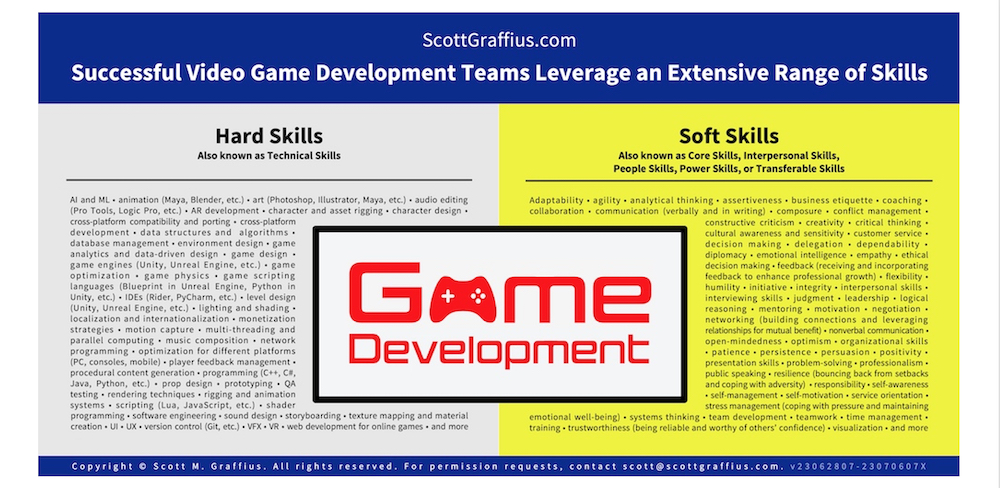
Select here to download a PDF of this article.
Behind every great video game is a team of creative and technical wizards. Creators, storytellers, designers, artists, developers, testers, and others collaborate and leverage a diverse range of hard skills (also known as technical skills) and soft skills (also known as interpersonal skills) to craft an exceptional end-product.
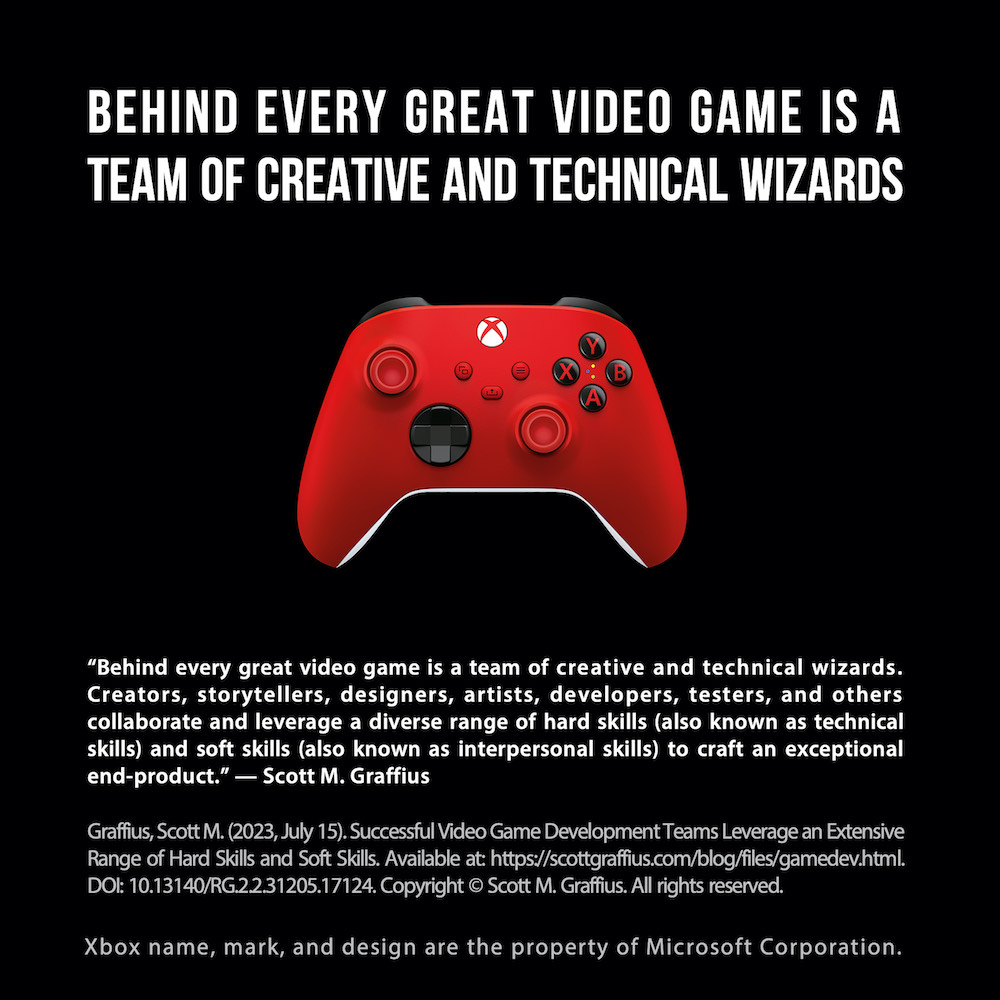
Here's a select listing of hard skills for video game development teams:
And here's a select listing of soft skills for video game development teams:
Of the many skills, one — a soft skill — is paramount. Activision Blizzard and other premiere developers and publishers of entertainment experiences identify teamwork as critical for the successful development of video games.
Informed by Scott M. Graffius’s first-hand work with game development teams as well as research and coverage from Activision Blizzard, Gameloft, International Game Developers Association, Microsoft, Rockstar Games, Sony Interactive Entertainment, and others, Graffius delivers a deep-dive on the essential teamwork skill based on the science of high-performing teams to audiences at game development conferences and other events. The information can provide attendees, their teams, and their organization with a competitive advantage!
Invited by conferences, businesses, professional organizations, governments, and universities, Graffius delivers talks and workshops on Agile, project management, and technology leadership — inclusive of AI, GameDev, TeamDev, and more. To date, he's delivered 87 sessions across 25 countries. Visit here for details on his upcoming and prior sessions.

How to Cite This Article
Graffius, Scott M. (2023, July 15). Successful Video Game Development Teams Leverage an Extensive Range of Hard Skills and Soft Skills. Available at: https://scottgraffius.com/blog/files/gamedev.html. DOI: 10.13140/RG.2.2.31205.17124.

Permission Request Information
To request permission to use material from this article, email Scott M. Graffius.




About Scott M. Graffius
Scott M. Graffius, PMP, SA, CSP-SM, CSP-PO, CSM, CSPO, SFE, ITIL, LSSGB is an agile project management practitioner, consultant, multi-award-winning author, and international keynote speaker. He is the Founder of Exceptional PPM and PMO Solutions™ and subsidiary Exceptional Agility™. He has generated over $1.9 billion of business value in aggregate for Global Fortune 500 businesses and other organizations he has served. Graffius and content from his books, talks, workshops, and more have been featured and used by businesses, professional associations, governments, and universities. Examples include Microsoft, Oracle, Broadcom, Cisco, Gartner, Project Management Institute, IEEE, Qantas, National Academy of Sciences, United States Department of Energy, New Zealand Ministry of Education, Yale University, Tufts University, and others. He has delighted audiences with dynamic and engaging talks and workshops on agile, project management, and technology (including AI, GameDev, and more) leadership at 87 conferences and other events across 25 countries.
His full bio is available here.
Connect with Scott on:


About Agile Scrum: Your Quick Start Guide with Step-by-Step Instructions

Shifting customer needs are common in today's marketplace. Businesses must be adaptive and responsive to change while delivering an exceptional customer experience to be competitive.
There are a variety of frameworks supporting the development of products and services, and most approaches fall into one of two broad categories: traditional or agile. Traditional practices such as waterfall engage sequential development, while agile involves iterative and incremental deliverables. Organizations are increasingly embracing agile to manage projects, and best meet their business needs of rapid response to change, fast delivery speed, and more.
With clear and easy to follow instructions, the multi award-winning Agile Scrum: Your Quick Start Guide with Step-by-Step Instructions book by Scott M. Graffius (Chris Hare and Colin Giffen, Technical Editors) helps the reader:
Hailed by Literary Titan as “the book highlights the versatility of Scrum beautifully.”
Winner of 17 first place awards.
Agile Scrum: Your Quick Start Guide with Step-by-Step Instructions is available in paperback and ebook/Kindle in the United States and around the world. Some links by country follow.

About Agile Transformation: A Brief Story of How an Entertainment Company Developed New Capabilities and Unlocked Business Agility to Thrive in an Era of Rapid Change

Thriving in today's marketplace frequently depends on making a transformation to become more agile. Those successful in the transition enjoy faster delivery speed and ROI, higher satisfaction, continuous improvement, and additional benefits.
Based on actual events, Agile Transformation: A Brief Story of How an Entertainment Company Developed New Capabilities and Unlocked Business Agility to Thrive in an Era of Rapid Change provides a quick (60-90 minute) read about a successful agile transformation at a multinational entertainment and media company, told from the author's perspective as an agile coach.
The award-winning book by Scott M. Graffius is available in paperback and ebook/Kindle in the United States and around the world. Some links by country follow.

The short link for this article is: https://bit.ly/gamedev7
© Copyright 2023 Scott M. Graffius. All rights reserved. This material may not be published, broadcast, rewritten or redistributed without the express written permission of Scott M. Graffius.


Select here to download a PDF of this article.
Behind every great video game is a team of creative and technical wizards. Creators, storytellers, designers, artists, developers, testers, and others collaborate and leverage a diverse range of hard skills (also known as technical skills) and soft skills (also known as interpersonal skills) to craft an exceptional end-product.

Here's a select listing of hard skills for video game development teams:
- Artificial intelligence (AI) and machine learning (ML)
- Animation (Maya, Blender, etc.)
- Art (Photoshop, Illustrator, Maya, etc.)
- Audio editing (Pro Tools, Logic Pro, etc.)
- Augmented Reality (AR) development
- Character and asset rigging
- Character design
- Cross-platform compatibility and porting
- Cross-platform development
- Data structures and algorithms
- Database management
- Environment design
- Game analytics and data-driven design
- Game design
- Game engines (Unity, Unreal Engine, etc.)
- Game optimization
- Game physics
- Game scripting languages (Blueprint in Unreal Engine, Python in Unity, etc.)
- Integrated development environment (IDE) (Rider, PyCharm, etc.)
- Level design (Unity, Unreal Engine, etc.)
- Lighting and shading
- Localization and internationalization
- Monetization strategies
- Motion capture
- Multi-threading and parallel computing
- Music composition
- Network programming
- Optimization for different platforms (consoles, PCs, mobile, AR, VR, smart TVs, streaming devices)
- Player feedback management
- Procedural content generation
- Programming (C++, C#, Java, Python, etc.)
- Prop design
- Prototyping
- Quality assurance (QA) testing
- Rendering techniques
- Rigging and animation systems
- Scripting (Lua, JavaScript, etc.)
- Shader programming
- Software engineering
- Sound design
- Storyboarding
- Texture mapping and material creation
- User interface (UI)
- User experience (UX)
- Version control (Git, etc.)
- Visual effects (VFX)
- Virtual reality (VR)
- Web development for online games
- and more
And here's a select listing of soft skills for video game development teams:
- Adaptability
- Agility
- Analytical thinking
- Assertiveness
- Business etiquette
- Coaching
- Collaboration
- Communication (verbally and in writing)
- Composure
- Conflict management
- Constructive criticism
- Creativity
- Critical thinking
- Cultural awareness and sensitivity
- Customer service
- Decision making
- Delegation
- Dependability
- Diplomacy
- Emotional intelligence
- Empathy
- Ethical decision making
- Feedback (receiving and incorporating feedback to enhance professional growth)
- Flexibility
- Humility
- Initiative
- Integrity
- Interpersonal skills
- Interviewing skills
- Judgment
- Leadership
- Logical reasoning
- Mentoring
- Motivation
- Negotiation
- Networking (building connections and leveraging relationships for mutual benefit)
- Nonverbal communication
- Open-mindedness
- Optimism
- Organizational skills
- Patience
- Persistence
- Persuasion
- Positivity
- Presentation skills
- Problem-solving
- Professionalism
- Public speaking
- Resilience (bouncing back from setbacks and coping with adversity)
- Responsibility
- Self-awareness
- Self-management
- Self-motivation
- Service orientation
- Stress management (coping with pressure and maintaining emotional well-being)
- Systems thinking
- Team development
- Teamwork
- Time management
- Training
- Trustworthiness (being reliable and worthy of others’ confidence)
- Visualization
- and more
Of the many skills, one — a soft skill — is paramount. Activision Blizzard and other premiere developers and publishers of entertainment experiences identify teamwork as critical for the successful development of video games.
Informed by Scott M. Graffius’s first-hand work with game development teams as well as research and coverage from Activision Blizzard, Gameloft, International Game Developers Association, Microsoft, Rockstar Games, Sony Interactive Entertainment, and others, Graffius delivers a deep-dive on the essential teamwork skill based on the science of high-performing teams to audiences at game development conferences and other events. The information can provide attendees, their teams, and their organization with a competitive advantage!
Invited by conferences, businesses, professional organizations, governments, and universities, Graffius delivers talks and workshops on Agile, project management, and technology leadership — inclusive of AI, GameDev, TeamDev, and more. To date, he's delivered 87 sessions across 25 countries. Visit here for details on his upcoming and prior sessions.

How to Cite This Article
Graffius, Scott M. (2023, July 15). Successful Video Game Development Teams Leverage an Extensive Range of Hard Skills and Soft Skills. Available at: https://scottgraffius.com/blog/files/gamedev.html. DOI: 10.13140/RG.2.2.31205.17124.

Permission Request Information
To request permission to use material from this article, email Scott M. Graffius.



About Scott M. Graffius
Scott M. Graffius, PMP, SA, CSP-SM, CSP-PO, CSM, CSPO, SFE, ITIL, LSSGB is an agile project management practitioner, consultant, multi-award-winning author, and international keynote speaker. He is the Founder of Exceptional PPM and PMO Solutions™ and subsidiary Exceptional Agility™. He has generated over $1.9 billion of business value in aggregate for Global Fortune 500 businesses and other organizations he has served. Graffius and content from his books, talks, workshops, and more have been featured and used by businesses, professional associations, governments, and universities. Examples include Microsoft, Oracle, Broadcom, Cisco, Gartner, Project Management Institute, IEEE, Qantas, National Academy of Sciences, United States Department of Energy, New Zealand Ministry of Education, Yale University, Tufts University, and others. He has delighted audiences with dynamic and engaging talks and workshops on agile, project management, and technology (including AI, GameDev, and more) leadership at 87 conferences and other events across 25 countries.
His full bio is available here.
Connect with Scott on:


About Agile Scrum: Your Quick Start Guide with Step-by-Step Instructions

Shifting customer needs are common in today's marketplace. Businesses must be adaptive and responsive to change while delivering an exceptional customer experience to be competitive.
There are a variety of frameworks supporting the development of products and services, and most approaches fall into one of two broad categories: traditional or agile. Traditional practices such as waterfall engage sequential development, while agile involves iterative and incremental deliverables. Organizations are increasingly embracing agile to manage projects, and best meet their business needs of rapid response to change, fast delivery speed, and more.
With clear and easy to follow instructions, the multi award-winning Agile Scrum: Your Quick Start Guide with Step-by-Step Instructions book by Scott M. Graffius (Chris Hare and Colin Giffen, Technical Editors) helps the reader:
- Implement and use the most popular agile framework―Scrum;
- Deliver products in short cycles with rapid adaptation to change, fast time-to-market, and continuous improvement; and
- Support innovation and drive competitive advantage.
Hailed by Literary Titan as “the book highlights the versatility of Scrum beautifully.”
Winner of 17 first place awards.
Agile Scrum: Your Quick Start Guide with Step-by-Step Instructions is available in paperback and ebook/Kindle in the United States and around the world. Some links by country follow.
- 🇧🇷 Brazil
- 🇨🇦 Canada
- 🇨🇿 Czech Republic
- 🇩🇰 Denmark
- 🇫🇮 Finland
- 🇫🇷 France
- 🇩🇪 Germany
- 🇬🇷 Greece
- 🇭🇺 Hungary
- 🇮🇳 India
- 🇮🇪 Ireland
- 🇮🇱 Israel
- 🇮🇹 Italy
- 🇯🇵 Japan
- 🇱🇺 Luxembourg
- 🇲🇽 Mexico
- 🇳🇱 Netherlands
- 🇳🇿 New Zealand
- 🇳🇴 Norway
- 🇪🇸 Spain
- 🇸🇪 Sweden
- 🇨🇭 Switzerland
- 🇦🇪 UAE
- 🇬🇧 United Kingdom
- 🇺🇸 United States

About Agile Transformation: A Brief Story of How an Entertainment Company Developed New Capabilities and Unlocked Business Agility to Thrive in an Era of Rapid Change

Thriving in today's marketplace frequently depends on making a transformation to become more agile. Those successful in the transition enjoy faster delivery speed and ROI, higher satisfaction, continuous improvement, and additional benefits.
Based on actual events, Agile Transformation: A Brief Story of How an Entertainment Company Developed New Capabilities and Unlocked Business Agility to Thrive in an Era of Rapid Change provides a quick (60-90 minute) read about a successful agile transformation at a multinational entertainment and media company, told from the author's perspective as an agile coach.
The award-winning book by Scott M. Graffius is available in paperback and ebook/Kindle in the United States and around the world. Some links by country follow.
- 🇦🇺 Australia
- 🇦🇹 Austria
- 🇧🇷 Brazil
- 🇨🇦 Canada
- 🇨🇿 Czech Republic
- 🇩🇰 Denmark
- 🇫🇮 Finland
- 🇫🇷 France
- 🇩🇪 Germany
- 🇬🇷 Greece
- 🇮🇳 India
- 🇮🇪 Ireland
- 🇯🇵 Japan
- 🇱🇺 Luxembourg
- 🇲🇽 Mexico
- 🇳🇱 Netherlands
- 🇳🇿 New Zealand
- 🇪🇸 Spain
- 🇸🇪 Sweden
- 🇨🇭 Switzerland
- 🇦🇪 United Arab Emirates
- 🇬🇧 United Kingdom
- 🇺🇸 United States

The short link for this article is: https://bit.ly/gamedev7
© Copyright 2023 Scott M. Graffius. All rights reserved. This material may not be published, broadcast, rewritten or redistributed without the express written permission of Scott M. Graffius.

Should You Be Nasty or Nice in Negotiations?
22 January 2024
BY SCOTT M. GRAFFIUS | ScottGraffius.com
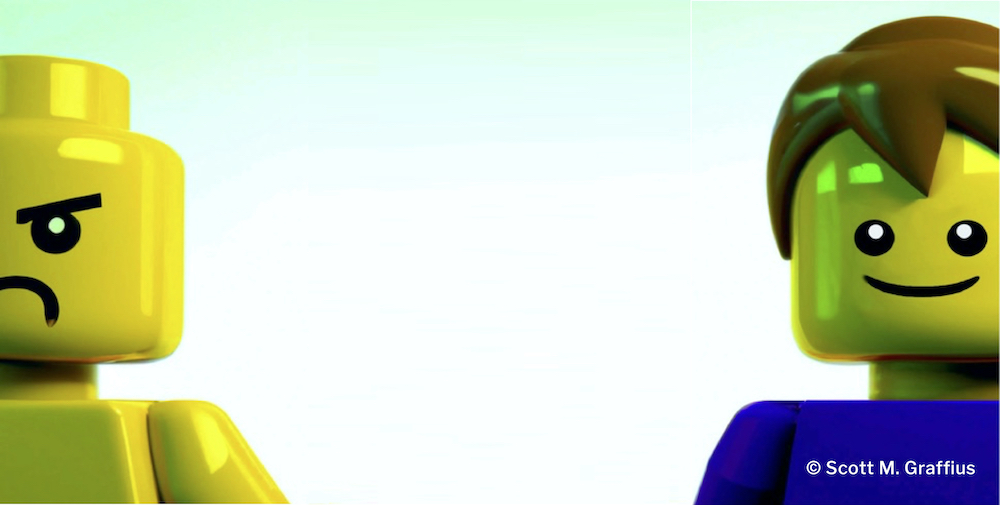
A PDF of this article is here.
Note: When discussing moods and behaviors related to negotiations, the respective research uses the terms “angry” or “nasty,” contrasted with “happy” or “nice.” For that reason, this article uses those same terms. Also consider that an unhappy, irritated, or frustrated person may be labeled as “angry.” And a tough, difficult, or demanding person may be labeled as “nasty.”

Introduction
Chances are that you’ve already participated in some form of negotiations in your personal or professional life and that you’ll do so in the future. Negotiation is defined as a discussion between two or more parties aimed at resolving points of difference, crafting outcomes to satisfy various interests, or otherwise establishing an agreement. Handling a job offer, asking for a promotion, and buying and selling property such as a car or a house are just a few examples of deals you may have executed. Enhancing your negotiation strategies, tactics, and skills can have a big payoff on the outcomes of future deals.

Main Section of Article
What can you add to your arsenal to help you maximize value at your next visit to the bargaining table? How about this: Is it advantageous to be nice or nasty in a negotiation? “The Interpersonal Effects of Anger and Happiness in Negotiations” — a study by Gerben A. Van Kleef and colleagues at the University of Amsterdam — uncovered the answer. Read on to gain insights from the work.
The study encompassed three experiments. The first experiment involved a computer-mediated negotiation in which participants couldn’t see their opponent. And participants were led to believe their counterpart was either happy or angry. The findings follow. Participants with an opponent who they thought was angry placed lower demands and made larger concessions than did participants with an opponent who they thought was happy.
The procedure for experiment 2 was similar to the first one. This one further explored the effect of the informed mood of negotiation counterparts. The results showed that participants used information on mood to infer their opponents’ limit and they adjusted their demands accordingly.
The third and final experiment examined the interplay between experienced and communicated emotion. It showed that angry communications (unlike happy ones) induced fear and thereby mitigated the effect of the counterpart’s experienced emotion.

Conclusion
In conclusion, the study by Van Kleef and colleagues found that negotiators are influenced by their counterpart’s emotions. It showed that the expression of anger can be advantageous in some negotiation scenarios, challenging the “golden rule” that always being nice wins.
However, being angry or nasty doesn’t mean acting unethically. And if a person is simply acting a certain way, doing so could backfire if their counterpart sees through the display.
Based on the study and additional resources delineated in the references/sources section of this article, here are some considerations regarding behavior and mood during negotiations.
When to be nice in negotiations:
When to be nasty in negotiations:
This article highlighted select valuable work on the nuances of negotiation behavior. For a deeper understanding, exploring the full research is highly recommended.


References/Sources
Select (partial) bibliography:

How to Cite This Article
Graffius, Scott M. (2024, January 22). Should You Be Nasty or Nice in Negotiations? Available at: https://scottgraffius.com/blog/files/win-win.html.




About Scott M. Graffius

Scott M. Graffius, PMP, SA, CSP-SM, CSP-PO, CSM, CSPO, SFE, ITIL, LSSGB is an agile project management practitioner, consultant, thinker, creator, multi-award-winning author, and international public speaker. Founder and CEO of Exceptional PPM and PMO Solutions™ and subsidiary Exceptional Agility™, he has generated over $1.9 billion for Global Fortune 500 businesses and other organizations he has served. Graffius and content from his books, talks, workshops, and more have been featured and used by Microsoft, Oracle, Broadcom, Cisco, Gartner, Project Management Institute, IEEE, National Academy of Sciences, United States Department of Energy, Yale University, Tufts University, and others. He delights audiences with dynamic and engaging talks and workshops on agile project management, AI, Tech leadership, video game development, strategic alignment, the science of high performance teams, and more. To date, he's presented sessions at 89 conferences and other events across 25 countries.
His full bio is available here.
Connect with Scott on:

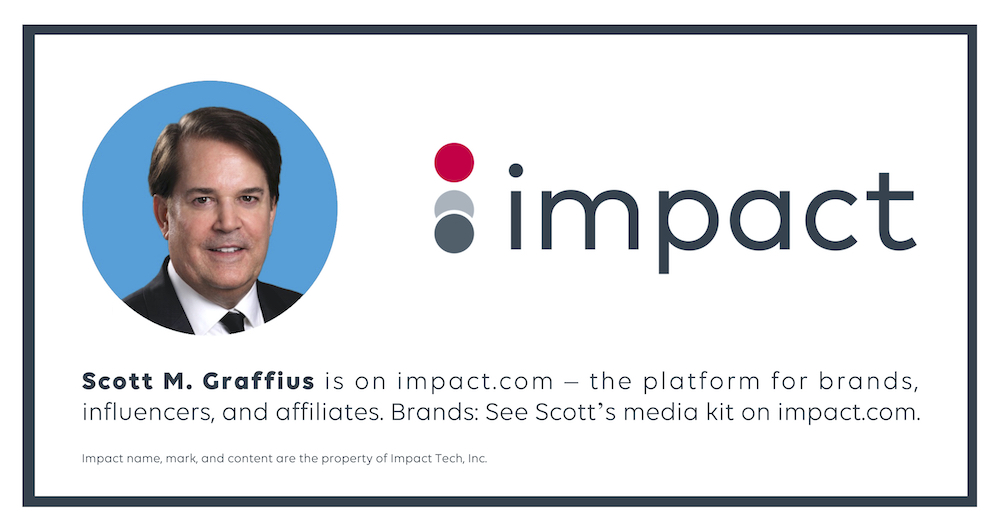

About Agile Scrum: Your Quick Start Guide with Step-by-Step Instructions

Shifting customer needs are common in today's marketplace. Businesses must be adaptive and responsive to change while delivering an exceptional customer experience to be competitive.
There are a variety of frameworks supporting the development of products and services, and most approaches fall into one of two broad categories: traditional or agile. Traditional practices such as waterfall engage sequential development, while agile involves iterative and incremental deliverables. Organizations are increasingly embracing agile to manage projects, and best meet their business needs of rapid response to change, fast delivery speed, and more.
With clear and easy to follow step-by-step instructions, Scott M. Graffius's award-winning Agile Scrum: Your Quick Start Guide with Step-by-Step Instructions helps the reader:
Hailed by Literary Titan as “the book highlights the versatility of Scrum beautifully.”
Winner of 17 first place awards.
Agile Scrum: Your Quick Start Guide with Step-by-Step Instructions is available in paperback and ebook/Kindle in the United States and around the world. Some links by country follow.

About Agile Transformation: A Brief Story of How an Entertainment Company Developed New Capabilities and Unlocked Business Agility to Thrive in an Era of Rapid Change

Thriving in today's marketplace frequently depends on making a transformation to become more agile. Those successful in the transition enjoy faster delivery speed and ROI, higher satisfaction, continuous improvement, and additional benefits.
Based on actual events, Agile Transformation: A Brief Story of How an Entertainment Company Developed New Capabilities and Unlocked Business Agility to Thrive in an Era of Rapid Change provides a quick (60-90 minute) read about a successful agile transformation at a multinational entertainment and media company, told from the author's perspective as an agile coach.
The award-winning book by Scott M. Graffius is available in paperback and ebook/Kindle in the United States and around the world. Some links by country follow.

The short link for this article is: https://bit.ly/win-skill
© Copyright 2024 Scott M. Graffius. All rights reserved. This material may not be published, broadcast, rewritten or redistributed without the express written permission of Scott M. Graffius.


A PDF of this article is here.
Note: When discussing moods and behaviors related to negotiations, the respective research uses the terms “angry” or “nasty,” contrasted with “happy” or “nice.” For that reason, this article uses those same terms. Also consider that an unhappy, irritated, or frustrated person may be labeled as “angry.” And a tough, difficult, or demanding person may be labeled as “nasty.”

Introduction
Chances are that you’ve already participated in some form of negotiations in your personal or professional life and that you’ll do so in the future. Negotiation is defined as a discussion between two or more parties aimed at resolving points of difference, crafting outcomes to satisfy various interests, or otherwise establishing an agreement. Handling a job offer, asking for a promotion, and buying and selling property such as a car or a house are just a few examples of deals you may have executed. Enhancing your negotiation strategies, tactics, and skills can have a big payoff on the outcomes of future deals.

Main Section of Article
What can you add to your arsenal to help you maximize value at your next visit to the bargaining table? How about this: Is it advantageous to be nice or nasty in a negotiation? “The Interpersonal Effects of Anger and Happiness in Negotiations” — a study by Gerben A. Van Kleef and colleagues at the University of Amsterdam — uncovered the answer. Read on to gain insights from the work.
The study encompassed three experiments. The first experiment involved a computer-mediated negotiation in which participants couldn’t see their opponent. And participants were led to believe their counterpart was either happy or angry. The findings follow. Participants with an opponent who they thought was angry placed lower demands and made larger concessions than did participants with an opponent who they thought was happy.
The procedure for experiment 2 was similar to the first one. This one further explored the effect of the informed mood of negotiation counterparts. The results showed that participants used information on mood to infer their opponents’ limit and they adjusted their demands accordingly.
The third and final experiment examined the interplay between experienced and communicated emotion. It showed that angry communications (unlike happy ones) induced fear and thereby mitigated the effect of the counterpart’s experienced emotion.

Conclusion
In conclusion, the study by Van Kleef and colleagues found that negotiators are influenced by their counterpart’s emotions. It showed that the expression of anger can be advantageous in some negotiation scenarios, challenging the “golden rule” that always being nice wins.
However, being angry or nasty doesn’t mean acting unethically. And if a person is simply acting a certain way, doing so could backfire if their counterpart sees through the display.
Based on the study and additional resources delineated in the references/sources section of this article, here are some considerations regarding behavior and mood during negotiations.
When to be nice in negotiations:
- Long-term relationships: In repeated negotiations, fostering goodwill with friendly gestures like concessions or expressing empathy can benefit both parties in the long run. It builds trust and cooperation, creating a more positive environment for future deals.
- Information exchange: When seeking information from your counterpart, a friendly approach encourages them to be open and share more readily. Creating a comfortable atmosphere lowers their guard and increases cooperation.
- Concessions for compromise: When seeking a compromise, initiating friendliness can signal your willingness to concede and encourage reciprocation from the other party, leading to a mutually beneficial agreement.
When to be nasty in negotiations:
- Short-term gains: In one-off negotiations, a strategic display of toughness (e.g., setting high demands, expressing firm resolve) can intimidate your opponent and pressure them into accepting less favorable terms.
- Protecting resources: When facing an unfair or demanding adversary, a firm and assertive stance can help protect your resources and prevent exploitation.
- Signaling strength: In situations where your bargaining power is unclear, projecting confidence and strength through assertive communication can deter the other party from taking advantage of you.
This article highlighted select valuable work on the nuances of negotiation behavior. For a deeper understanding, exploring the full research is highly recommended.


References/Sources
Select (partial) bibliography:
- Barry, B. (1999). The Tactical Use of Emotion in Negotiation. Research on Negotiation in Organizations, 7: 93-121.
- Clark, M.S., & Taraban, C.B. (1991). Reactions to and Willingness to Express Emotion in Two Types of Relationships. Journal of Experimental Social Psychology, 27: 324-336.
- Frijda, N.H. (1986). The Emotions. Cambridge, England: Cambridge University Press.
- Harvard Law School (2010, March 9). Should You be Nasty or Nice? Program on Negotiation, Harvard Law School. Available at: https://www.pon.harvard.edu/daily/negotiation-skills-daily/should-you-be-nasty-or-nice.
- Keltner, D., & Haidt, J. (1999). Social Functions of Emotions at Four Levels of Analysis. Cognition and Emotion, 13: 505-521.
- Hüffmeier, J., Freund, P. A., Zerres, A., Backhaus, K., & Hertel, G. (2014). Being Tough or Being Nice? A Meta-Analysis on the Impact of Hard- and Softline Strategies in Distributive Negotiations. Journal of Management, 40 (3): 866-892.
- Pietroni, D., Van Kleef, G.A., De Dreu, C.K.W., & Pagliaro, S. (2008). Emotions as Strategic Information: Effects of Other’s Emotions on Fixed-Pie Perception, Demands and Integrative Behavior in Negotiation. Journal of Experimental Social Psychology, 44: 1444-1454.
- Reis, H.T., & Collins, W.A. (2004). Relationships, Human Behavior, and Psychological Science. Current Directions in Psychological Science, 13: 233-237.
- Schwarz, N., & Clore, G.L. (1983). Mood, Misattribution, and Judgments of Well-Being: Informative and Directive Functions of Affective States. Journal of Personality and Social Psychology, 45: 513-523.
- Sinaceur, M., Adam, H., Van Kleef, G. & Galinsky, A. (2013, May 1). The advantages of being unpredictable: How emotional inconsistency extracts concessions in negotiation. Journal of Experimental Social Psychology, 49: 498-508.
- Thayer, S. (1980). The Effect of Facial Expression Sequence Upon Judgments of Emotion. Journal of Social Psychology, 111: 305-306.
- Van Beest, I., Van Kleef, G.A., & Van Dijk, E. (2008). Get Angry, Get Out: The Interpersonal Effects of Anger Communication in Multiparty Negotiation. Journal of Experimental Social Psychology, 44: 993-1002.
- Van Kleef, G. A. (2009). How Emotions Regulate Social Life: The Emotions as Social Information (EASI) Model. Current Directions in Psychological Science, 18 (3): 184-188.
- Van Kleef, G.A., De Dreu, C.K.W., & Manstead, A.S.R. (2004). The Interpersonal Effects of Anger and Happiness in Negotiations. Journal of Personality and Social Psychology, 86: 57-76.
- Voss, C. (2016). Never Split the Difference: Negotiating as if Your Life Depended on It. New York, New York: Harper Business.

How to Cite This Article
Graffius, Scott M. (2024, January 22). Should You Be Nasty or Nice in Negotiations? Available at: https://scottgraffius.com/blog/files/win-win.html.




About Scott M. Graffius

Scott M. Graffius, PMP, SA, CSP-SM, CSP-PO, CSM, CSPO, SFE, ITIL, LSSGB is an agile project management practitioner, consultant, thinker, creator, multi-award-winning author, and international public speaker. Founder and CEO of Exceptional PPM and PMO Solutions™ and subsidiary Exceptional Agility™, he has generated over $1.9 billion for Global Fortune 500 businesses and other organizations he has served. Graffius and content from his books, talks, workshops, and more have been featured and used by Microsoft, Oracle, Broadcom, Cisco, Gartner, Project Management Institute, IEEE, National Academy of Sciences, United States Department of Energy, Yale University, Tufts University, and others. He delights audiences with dynamic and engaging talks and workshops on agile project management, AI, Tech leadership, video game development, strategic alignment, the science of high performance teams, and more. To date, he's presented sessions at 89 conferences and other events across 25 countries.
His full bio is available here.
Connect with Scott on:



About Agile Scrum: Your Quick Start Guide with Step-by-Step Instructions

Shifting customer needs are common in today's marketplace. Businesses must be adaptive and responsive to change while delivering an exceptional customer experience to be competitive.
There are a variety of frameworks supporting the development of products and services, and most approaches fall into one of two broad categories: traditional or agile. Traditional practices such as waterfall engage sequential development, while agile involves iterative and incremental deliverables. Organizations are increasingly embracing agile to manage projects, and best meet their business needs of rapid response to change, fast delivery speed, and more.
With clear and easy to follow step-by-step instructions, Scott M. Graffius's award-winning Agile Scrum: Your Quick Start Guide with Step-by-Step Instructions helps the reader:
- Implement and use the most popular agile framework―Scrum;
- Deliver products in short cycles with rapid adaptation to change, fast time-to-market, and continuous improvement; and
- Support innovation and drive competitive advantage.
Hailed by Literary Titan as “the book highlights the versatility of Scrum beautifully.”
Winner of 17 first place awards.
Agile Scrum: Your Quick Start Guide with Step-by-Step Instructions is available in paperback and ebook/Kindle in the United States and around the world. Some links by country follow.
- 🇧🇷 Brazil
- 🇨🇦 Canada
- 🇨🇿 Czech Republic
- 🇩🇰 Denmark
- 🇫🇮 Finland
- 🇫🇷 France
- 🇩🇪 Germany
- 🇬🇷 Greece
- 🇭🇺 Hungary
- 🇮🇳 India
- 🇮🇪 Ireland
- 🇮🇱 Israel
- 🇮🇹 Italy
- 🇯🇵 Japan
- 🇱🇺 Luxembourg
- 🇲🇽 Mexico
- 🇳🇱 Netherlands
- 🇳🇿 New Zealand
- 🇳🇴 Norway
- 🇪🇸 Spain
- 🇸🇪 Sweden
- 🇨🇭 Switzerland
- 🇦🇪 UAE
- 🇬🇧 United Kingdom
- 🇺🇸 United States

About Agile Transformation: A Brief Story of How an Entertainment Company Developed New Capabilities and Unlocked Business Agility to Thrive in an Era of Rapid Change

Thriving in today's marketplace frequently depends on making a transformation to become more agile. Those successful in the transition enjoy faster delivery speed and ROI, higher satisfaction, continuous improvement, and additional benefits.
Based on actual events, Agile Transformation: A Brief Story of How an Entertainment Company Developed New Capabilities and Unlocked Business Agility to Thrive in an Era of Rapid Change provides a quick (60-90 minute) read about a successful agile transformation at a multinational entertainment and media company, told from the author's perspective as an agile coach.
The award-winning book by Scott M. Graffius is available in paperback and ebook/Kindle in the United States and around the world. Some links by country follow.
- 🇦🇺 Australia
- 🇦🇹 Austria
- 🇧🇷 Brazil
- 🇨🇦 Canada
- 🇨🇿 Czech Republic
- 🇩🇰 Denmark
- 🇫🇮 Finland
- 🇫🇷 France
- 🇩🇪 Germany
- 🇬🇷 Greece
- 🇮🇳 India
- 🇮🇪 Ireland
- 🇯🇵 Japan
- 🇱🇺 Luxembourg
- 🇲🇽 Mexico
- 🇳🇱 Netherlands
- 🇳🇿 New Zealand
- 🇪🇸 Spain
- 🇸🇪 Sweden
- 🇨🇭 Switzerland
- 🇦🇪 United Arab Emirates
- 🇬🇧 United Kingdom
- 🇺🇸 United States

The short link for this article is: https://bit.ly/win-skill
© Copyright 2024 Scott M. Graffius. All rights reserved. This material may not be published, broadcast, rewritten or redistributed without the express written permission of Scott M. Graffius.

Constructor University 2024 Advanced Software Technology Handbook References Scott M. Graffius' Work on Team Dynamics
15 November 2024
BY SCOTT M. GRAFFIUS | ScottGraffius.com


Constructor University, a private research institution with a global reputation for excellence and innovation, references Scott M. Graffius’ work. The university’s 2024 Handbook for Master of Science in Advanced Software Technology references Graffius’ ‘Phases of Team Development’ intellectual property on team dynamics, published at AgileScrumGuide.com.
The following exhibit shows the following from the university’s Handbook:
The exhibit also includes a visual of Graffius’ ‘Phases of Team Development.’

The current (2024) edition of Graffius' 'Phases of Team Development' is here.
Read on to learn:

About Constructor University
Constructor University, formerly known as Jacobs University Bremen, is a private, English-speaking research university located in Vegesack, Bremen, Germany. Renowned for its international perspective, Constructor University hosts students from over 110 countries, making it one of Germany's most culturally diverse universities. With approximately 80% international students and 33% international faculty, the campus fosters an environment where global citizenship is taught and lived.
The university provides a broad spectrum of interdisciplinary programs, spanning engineering, humanities, natural sciences, and social sciences, allowing students to pursue bachelor's, master's, and doctorate degrees. The academic structure uniquely blends elements from both the American and German educational systems. It offers a three-year undergraduate program instead of the typical four-year American model, which is tuition-based, alongside German academic rigor. Students engage in actual research projects with access to modern labs and technology.
Constructor University's campus is vibrant educational and residential community. It includes housing facilities, academic buildings, a library, sports, and leisure amenities, promoting a holistic learning environment where living and learning intertwine. The university's commitment to high academic standards is reflected in its rankings, where it consistently places among the top in Germany for its international outlook and has been recognized for its research and teaching excellence.
Visit https://www.constructor.university to learn more.

About Scott M. Graffius

Scott M. Graffius is a global leader in agile project management, an expert on teamwork tradecraft, an authority on temporal dynamics on social media platforms, a creator, a consultant, a trainer, an award-winning author, and an international public speaker.
See his bio to learn more.







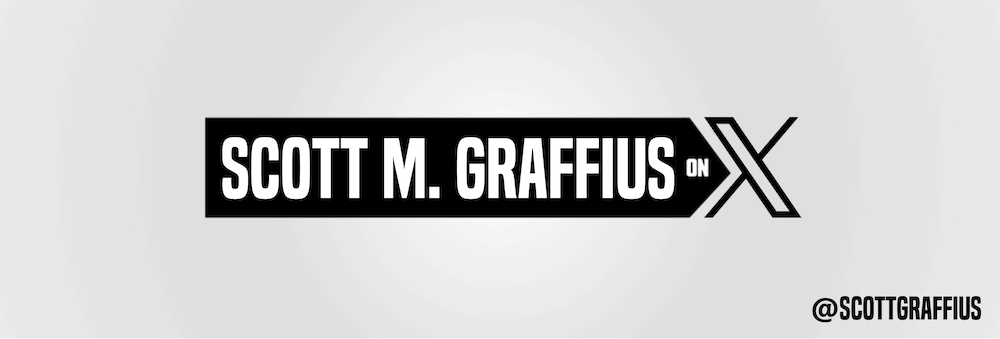


About Agile Scrum: Your Quick Start Guide with Step-by-Step Instructions

Shifting customer needs are common in today's marketplace. Businesses must be adaptive and responsive to change while delivering an exceptional customer experience to be competitive.
There are a variety of frameworks supporting the development of products and services, and most approaches fall into one of two broad categories: traditional or agile. Traditional practices such as waterfall engage sequential development, while agile involves iterative and incremental deliverables. Organizations are increasingly embracing agile to manage projects, and best meet their business needs of rapid response to change, fast delivery speed, and more.
With clear and easy to follow step-by-step instructions, Scott M. Graffius's award-winning Agile Scrum: Your Quick Start Guide with Step-by-Step Instructions helps the reader:
Hailed by Literary Titan as “the book highlights the versatility of Scrum beautifully.”
Winner of 17 first place awards.
Agile Scrum: Your Quick Start Guide with Step-by-Step Instructions is available in paperback and ebook/Kindle in the United States and around the world. Some links by country follow.

About Agile Transformation: A Brief Story of How an Entertainment Company Developed New Capabilities and Unlocked Business Agility to Thrive in an Era of Rapid Change

Thriving in today's marketplace frequently depends on making a transformation to become more agile. Those successful in the transition enjoy faster delivery speed and ROI, higher satisfaction, continuous improvement, and additional benefits.
Based on actual events, Agile Transformation: A Brief Story of How an Entertainment Company Developed New Capabilities and Unlocked Business Agility to Thrive in an Era of Rapid Change provides a quick (60-90 minute) read about a successful agile transformation at a multinational entertainment and media company, told from the author's perspective as an agile coach.
The award-winning book by Scott M. Graffius is available in paperback and ebook/Kindle in the United States and around the world. Some links by country follow.


How to Cite This Article
Graffius, Scott M. (2024, November 15). Constructor University 2024 Advanced Software Technology Handbook References Scott M. Graffius' Work on Team Dynamics. Available at: https://scottgraffius.com/blog/files/constructor-university-2024.html.


Digital Object Identifier (DOI)
DOI: 10.13140/RG.2.2.32809.61287
DOI link: https://dx.doi.org/10.13140/RG.2.2.32809.61287


Post-Publication Notes
If there are any supplements or updates to this article after the date of publication, they will appear here.


Content Acknowledgements
This article includes limited excerpts of content from Constructor University, attributed to Constructor University and used under fair use for news reporting and analysis.
Constructor University name, mark and content are the property of Constructor University Bremen gGmbH.
Graffius’ ‘Phases of Team Development’ is copyright © Scott M. Graffius. All rights reserved.


Copyright
Copyright © Scott M. Graffius. All rights reserved.
Content on this site—including text, images, videos, and data—may not be used for training or input into any artificial intelligence, machine learning, or automatized learning systems, or published, broadcast, rewritten, or redistributed without the express written permission of Scott M. Graffius.



Constructor University, a private research institution with a global reputation for excellence and innovation, references Scott M. Graffius’ work. The university’s 2024 Handbook for Master of Science in Advanced Software Technology references Graffius’ ‘Phases of Team Development’ intellectual property on team dynamics, published at AgileScrumGuide.com.
The following exhibit shows the following from the university’s Handbook:
- Page 1
- Page 77
- A zoomed-in view of page 77
- Page 79
- A zoomed-in view of page 79
- Page 81
- A zoomed-in view of page 81
The exhibit also includes a visual of Graffius’ ‘Phases of Team Development.’

The current (2024) edition of Graffius' 'Phases of Team Development' is here.
Read on to learn:
- About Constructor University,
- About Scott M. Graffius,
- How to Cite This Article,
- and more.

About Constructor University
Constructor University, formerly known as Jacobs University Bremen, is a private, English-speaking research university located in Vegesack, Bremen, Germany. Renowned for its international perspective, Constructor University hosts students from over 110 countries, making it one of Germany's most culturally diverse universities. With approximately 80% international students and 33% international faculty, the campus fosters an environment where global citizenship is taught and lived.
The university provides a broad spectrum of interdisciplinary programs, spanning engineering, humanities, natural sciences, and social sciences, allowing students to pursue bachelor's, master's, and doctorate degrees. The academic structure uniquely blends elements from both the American and German educational systems. It offers a three-year undergraduate program instead of the typical four-year American model, which is tuition-based, alongside German academic rigor. Students engage in actual research projects with access to modern labs and technology.
Constructor University's campus is vibrant educational and residential community. It includes housing facilities, academic buildings, a library, sports, and leisure amenities, promoting a holistic learning environment where living and learning intertwine. The university's commitment to high academic standards is reflected in its rankings, where it consistently places among the top in Germany for its international outlook and has been recognized for its research and teaching excellence.
Visit https://www.constructor.university to learn more.

About Scott M. Graffius

Scott M. Graffius is a global leader in agile project management, an expert on teamwork tradecraft, an authority on temporal dynamics on social media platforms, a creator, a consultant, a trainer, an award-winning author, and an international public speaker.
See his bio to learn more.









About Agile Scrum: Your Quick Start Guide with Step-by-Step Instructions

Shifting customer needs are common in today's marketplace. Businesses must be adaptive and responsive to change while delivering an exceptional customer experience to be competitive.
There are a variety of frameworks supporting the development of products and services, and most approaches fall into one of two broad categories: traditional or agile. Traditional practices such as waterfall engage sequential development, while agile involves iterative and incremental deliverables. Organizations are increasingly embracing agile to manage projects, and best meet their business needs of rapid response to change, fast delivery speed, and more.
With clear and easy to follow step-by-step instructions, Scott M. Graffius's award-winning Agile Scrum: Your Quick Start Guide with Step-by-Step Instructions helps the reader:
- Implement and use the most popular agile framework―Scrum;
- Deliver products in short cycles with rapid adaptation to change, fast time-to-market, and continuous improvement; and
- Support innovation and drive competitive advantage.
Hailed by Literary Titan as “the book highlights the versatility of Scrum beautifully.”
Winner of 17 first place awards.
Agile Scrum: Your Quick Start Guide with Step-by-Step Instructions is available in paperback and ebook/Kindle in the United States and around the world. Some links by country follow.
- 🇧🇷 Brazil
- 🇨🇦 Canada
- 🇨🇿 Czech Republic
- 🇩🇰 Denmark
- 🇫🇮 Finland
- 🇫🇷 France
- 🇩🇪 Germany
- 🇬🇷 Greece
- 🇭🇺 Hungary
- 🇮🇳 India
- 🇮🇪 Ireland
- 🇮🇱 Israel
- 🇮🇹 Italy
- 🇯🇵 Japan
- 🇱🇺 Luxembourg
- 🇲🇽 Mexico
- 🇳🇱 Netherlands
- 🇳🇿 New Zealand
- 🇳🇴 Norway
- 🇪🇸 Spain
- 🇸🇪 Sweden
- 🇨🇭 Switzerland
- 🇦🇪 UAE
- 🇬🇧 United Kingdom
- 🇺🇸 United States

About Agile Transformation: A Brief Story of How an Entertainment Company Developed New Capabilities and Unlocked Business Agility to Thrive in an Era of Rapid Change

Thriving in today's marketplace frequently depends on making a transformation to become more agile. Those successful in the transition enjoy faster delivery speed and ROI, higher satisfaction, continuous improvement, and additional benefits.
Based on actual events, Agile Transformation: A Brief Story of How an Entertainment Company Developed New Capabilities and Unlocked Business Agility to Thrive in an Era of Rapid Change provides a quick (60-90 minute) read about a successful agile transformation at a multinational entertainment and media company, told from the author's perspective as an agile coach.
The award-winning book by Scott M. Graffius is available in paperback and ebook/Kindle in the United States and around the world. Some links by country follow.
- 🇦🇺 Australia
- 🇦🇹 Austria
- 🇧🇷 Brazil
- 🇨🇦 Canada
- 🇨🇿 Czech Republic
- 🇩🇰 Denmark
- 🇫🇮 Finland
- 🇫🇷 France
- 🇩🇪 Germany
- 🇬🇷 Greece
- 🇮🇳 India
- 🇮🇪 Ireland
- 🇯🇵 Japan
- 🇱🇺 Luxembourg
- 🇲🇽 Mexico
- 🇳🇱 Netherlands
- 🇳🇿 New Zealand
- 🇪🇸 Spain
- 🇸🇪 Sweden
- 🇨🇭 Switzerland
- 🇦🇪 United Arab Emirates
- 🇬🇧 United Kingdom
- 🇺🇸 United States


How to Cite This Article
Graffius, Scott M. (2024, November 15). Constructor University 2024 Advanced Software Technology Handbook References Scott M. Graffius' Work on Team Dynamics. Available at: https://scottgraffius.com/blog/files/constructor-university-2024.html.


Digital Object Identifier (DOI)
DOI: 10.13140/RG.2.2.32809.61287
DOI link: https://dx.doi.org/10.13140/RG.2.2.32809.61287


Post-Publication Notes
If there are any supplements or updates to this article after the date of publication, they will appear here.


Content Acknowledgements
This article includes limited excerpts of content from Constructor University, attributed to Constructor University and used under fair use for news reporting and analysis.
Constructor University name, mark and content are the property of Constructor University Bremen gGmbH.
Graffius’ ‘Phases of Team Development’ is copyright © Scott M. Graffius. All rights reserved.


Copyright
Copyright © Scott M. Graffius. All rights reserved.
Content on this site—including text, images, videos, and data—may not be used for training or input into any artificial intelligence, machine learning, or automatized learning systems, or published, broadcast, rewritten, or redistributed without the express written permission of Scott M. Graffius.

